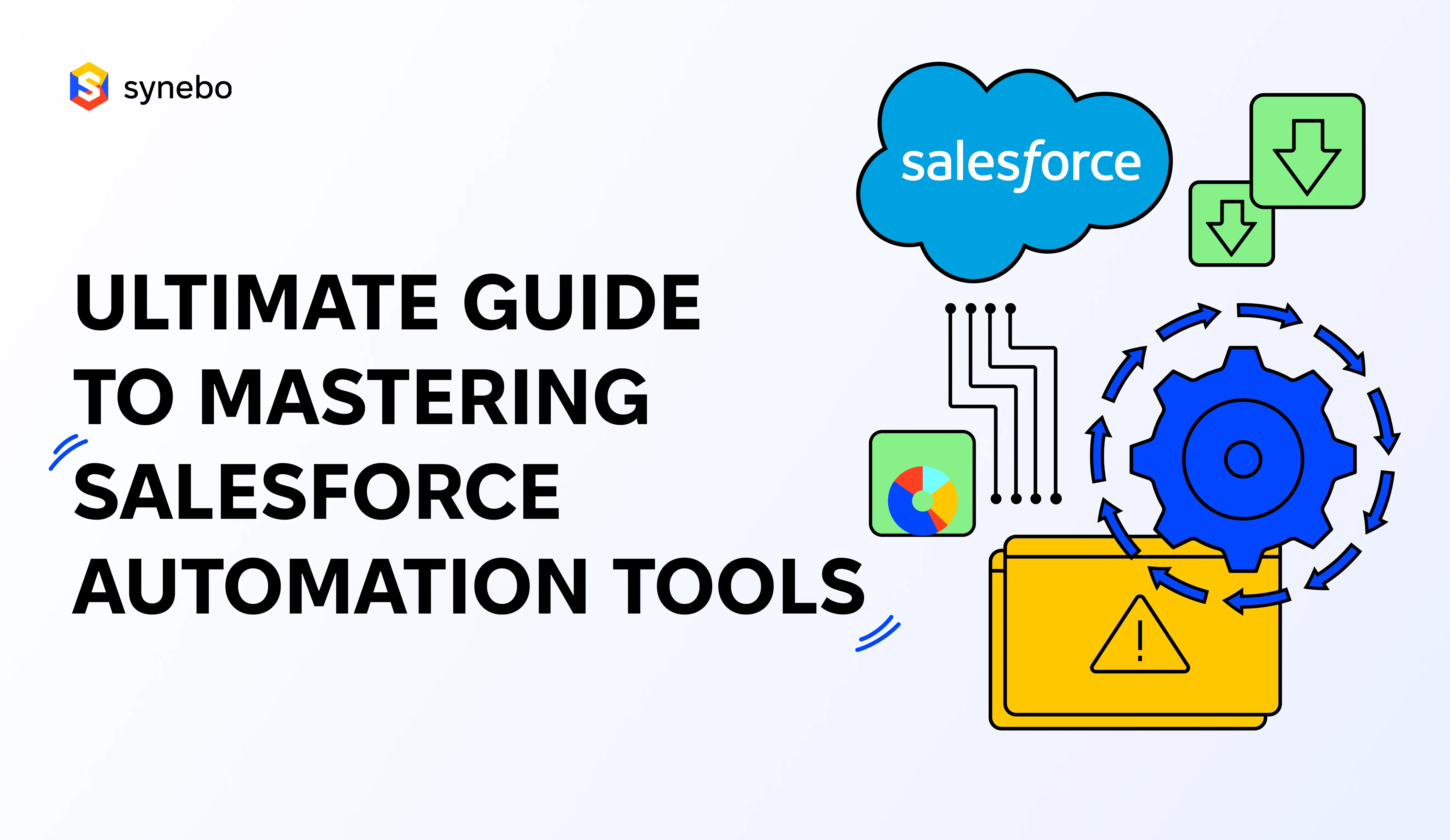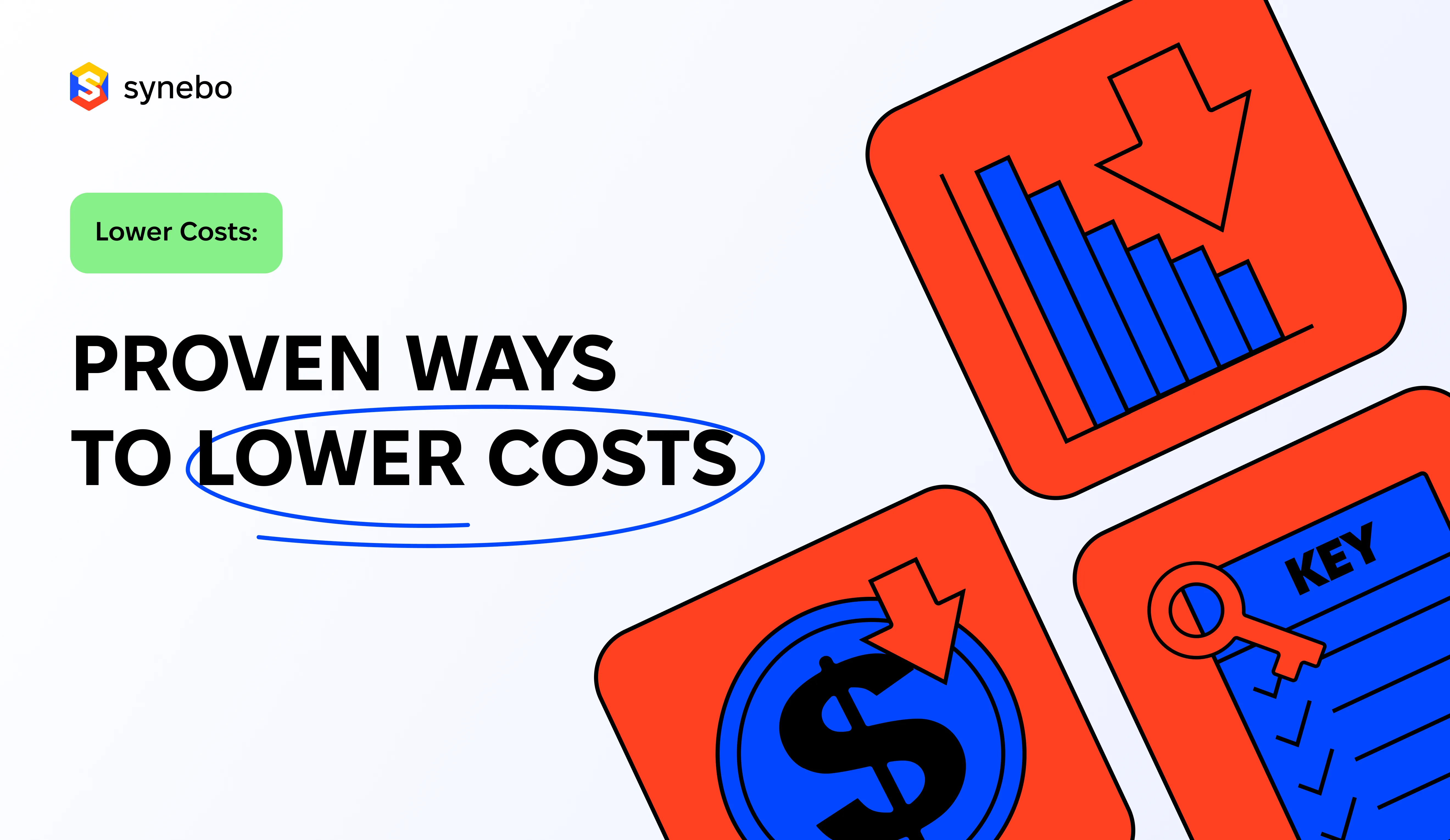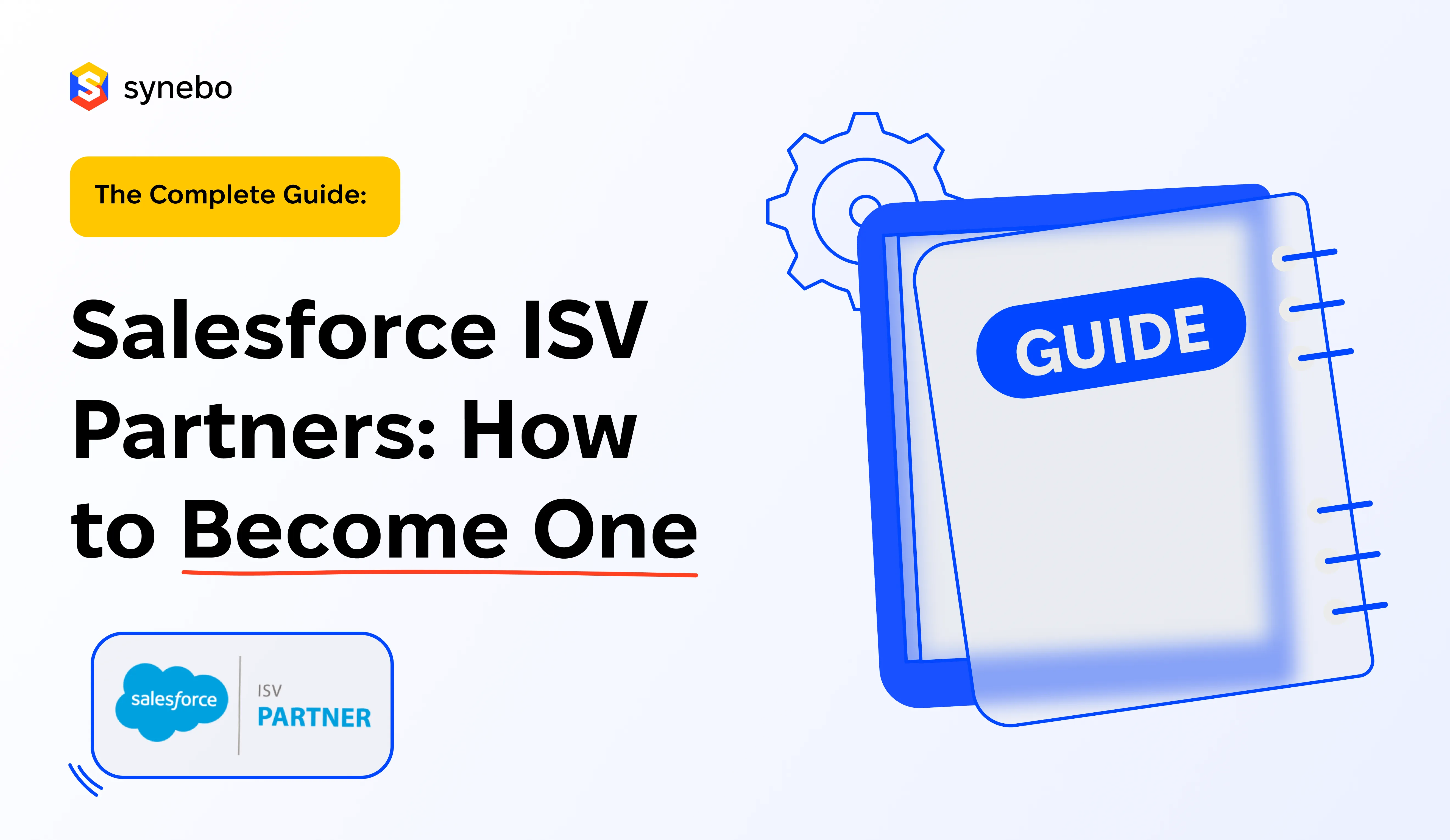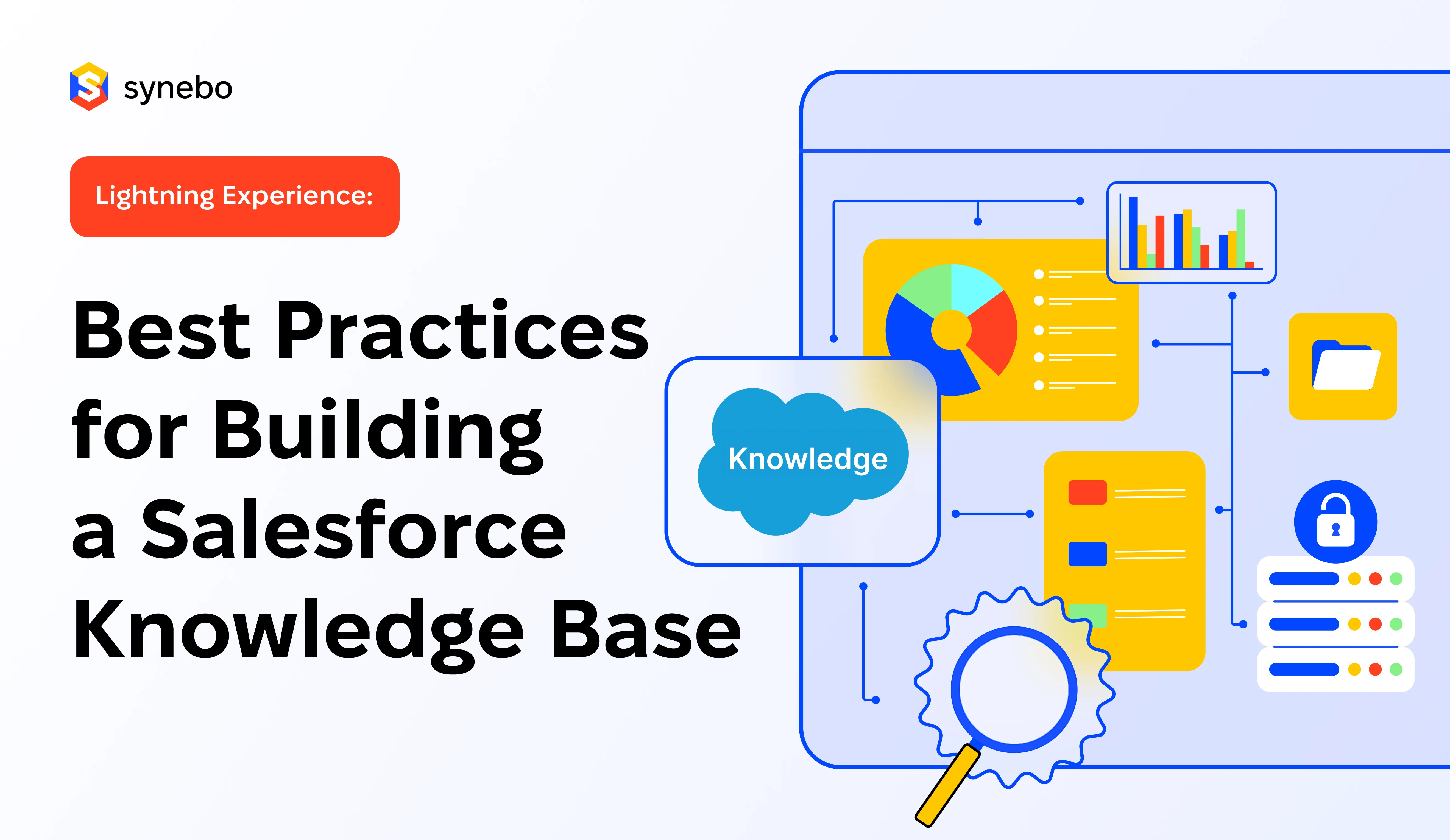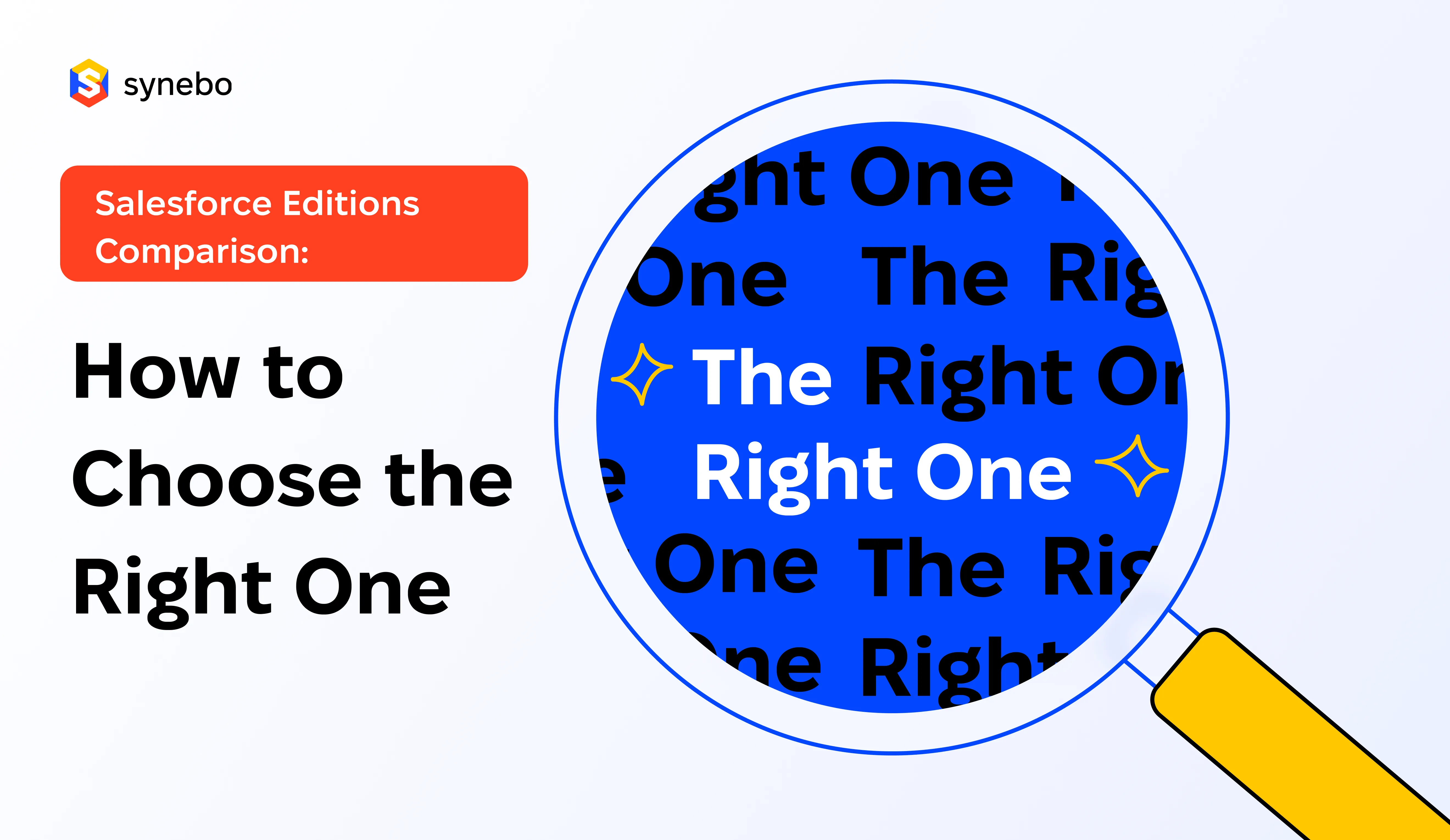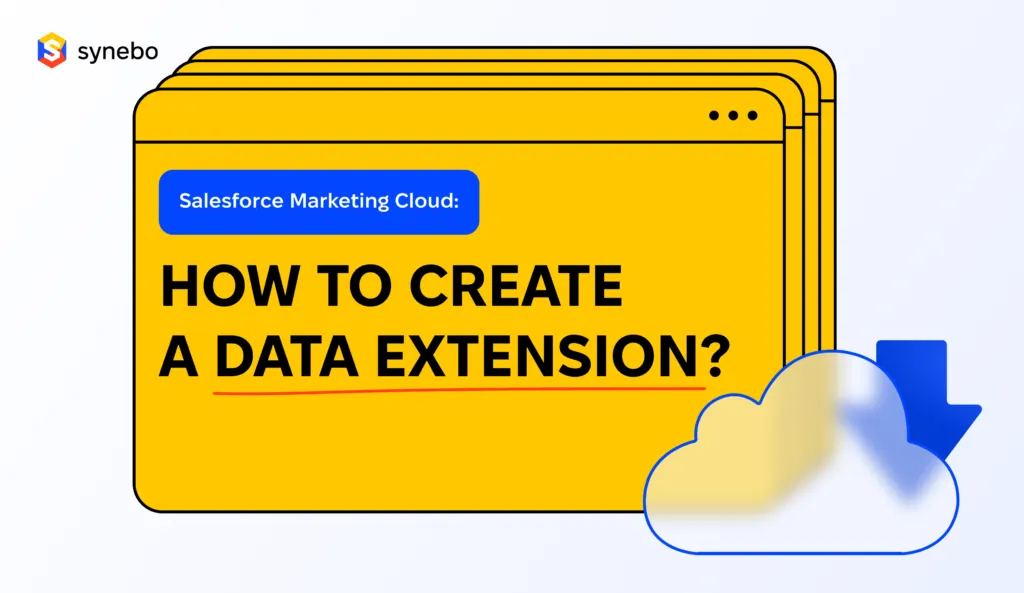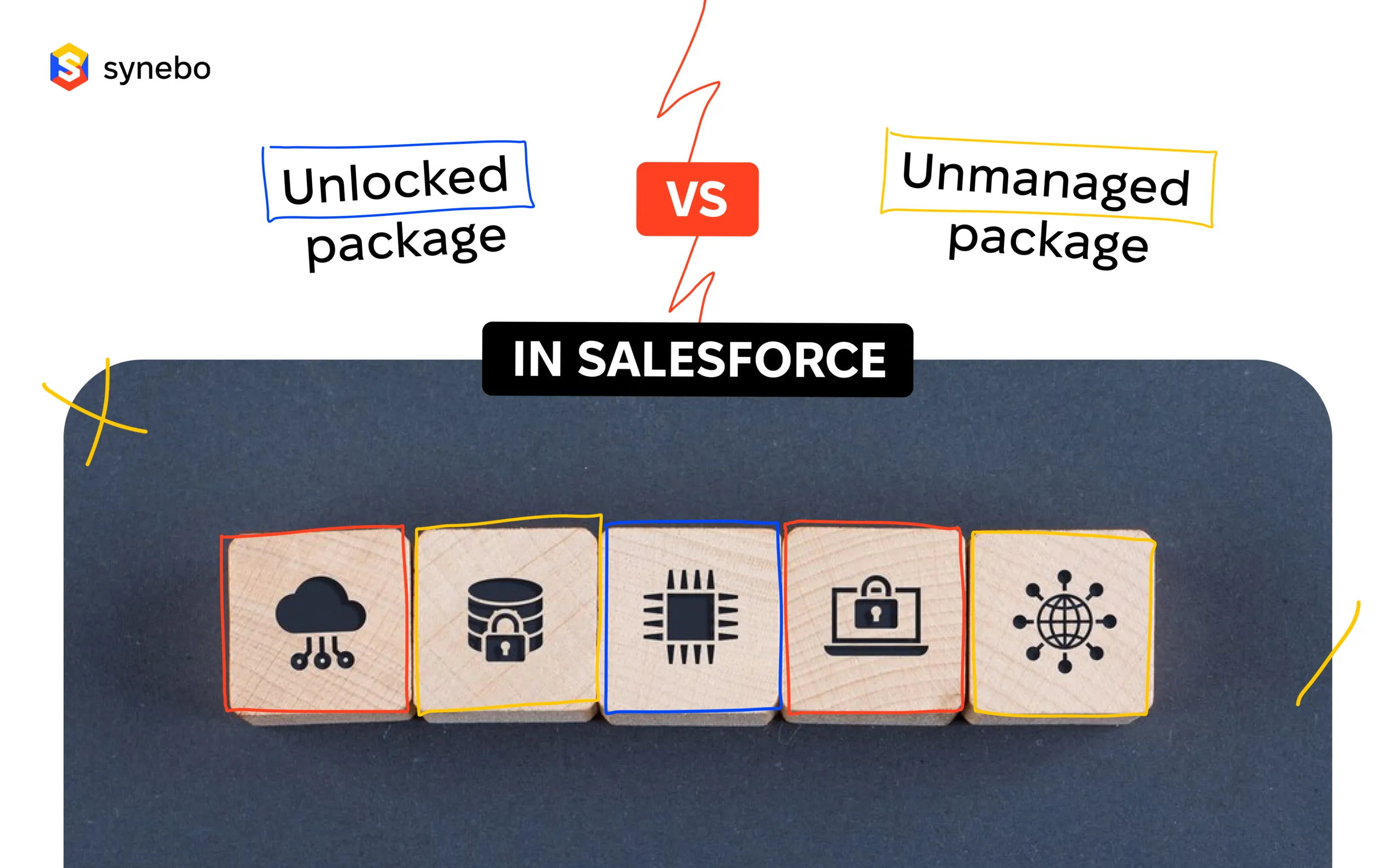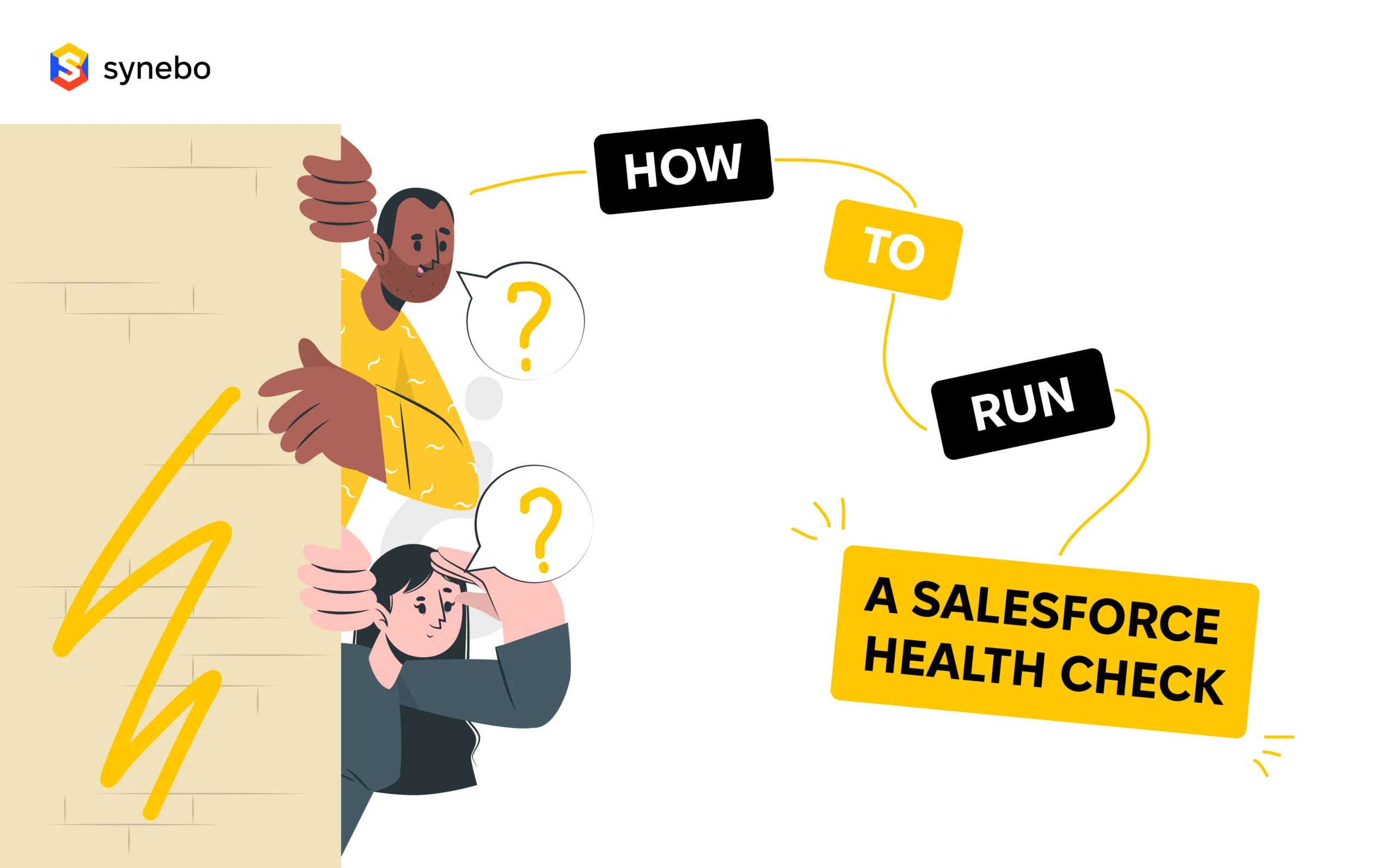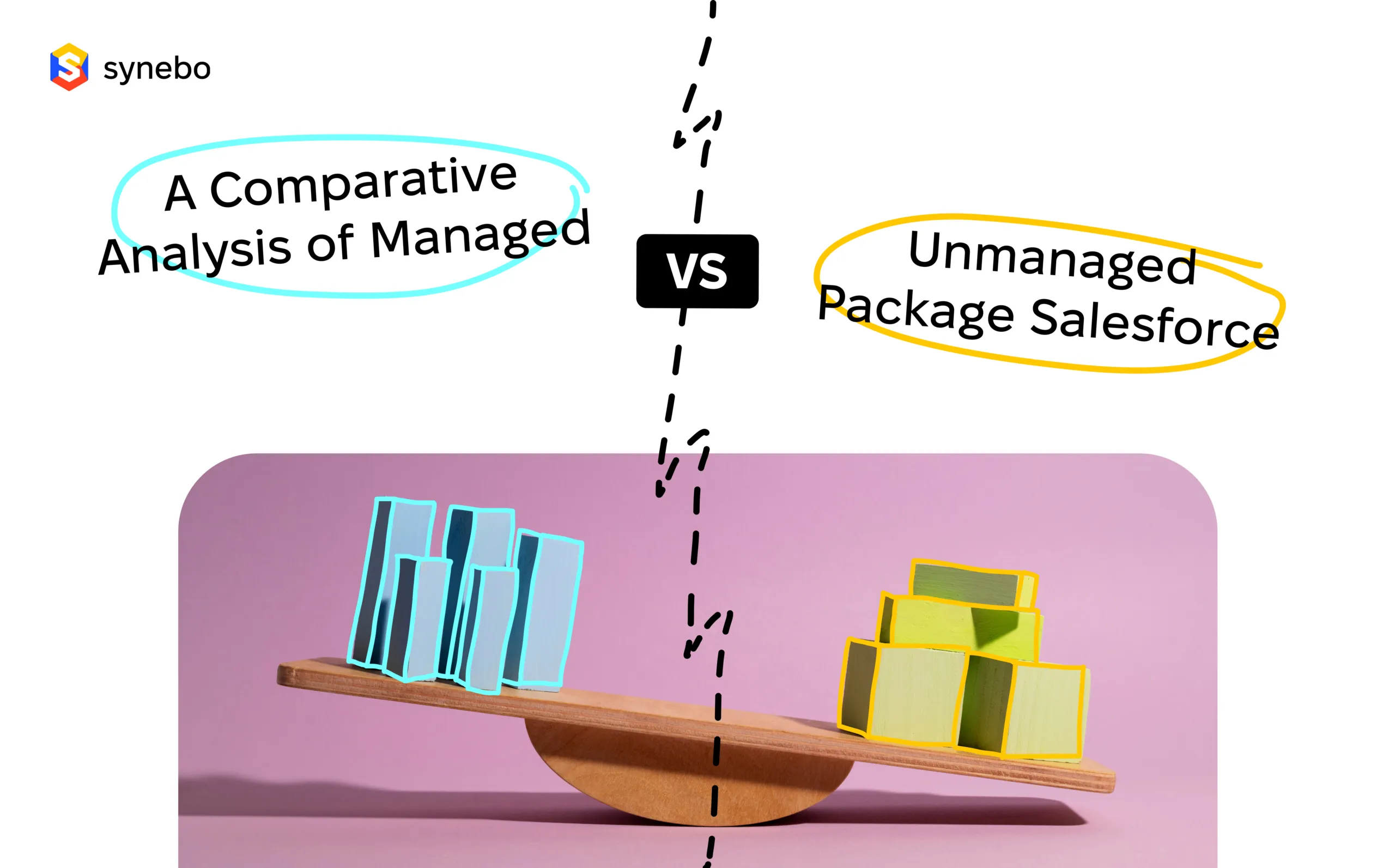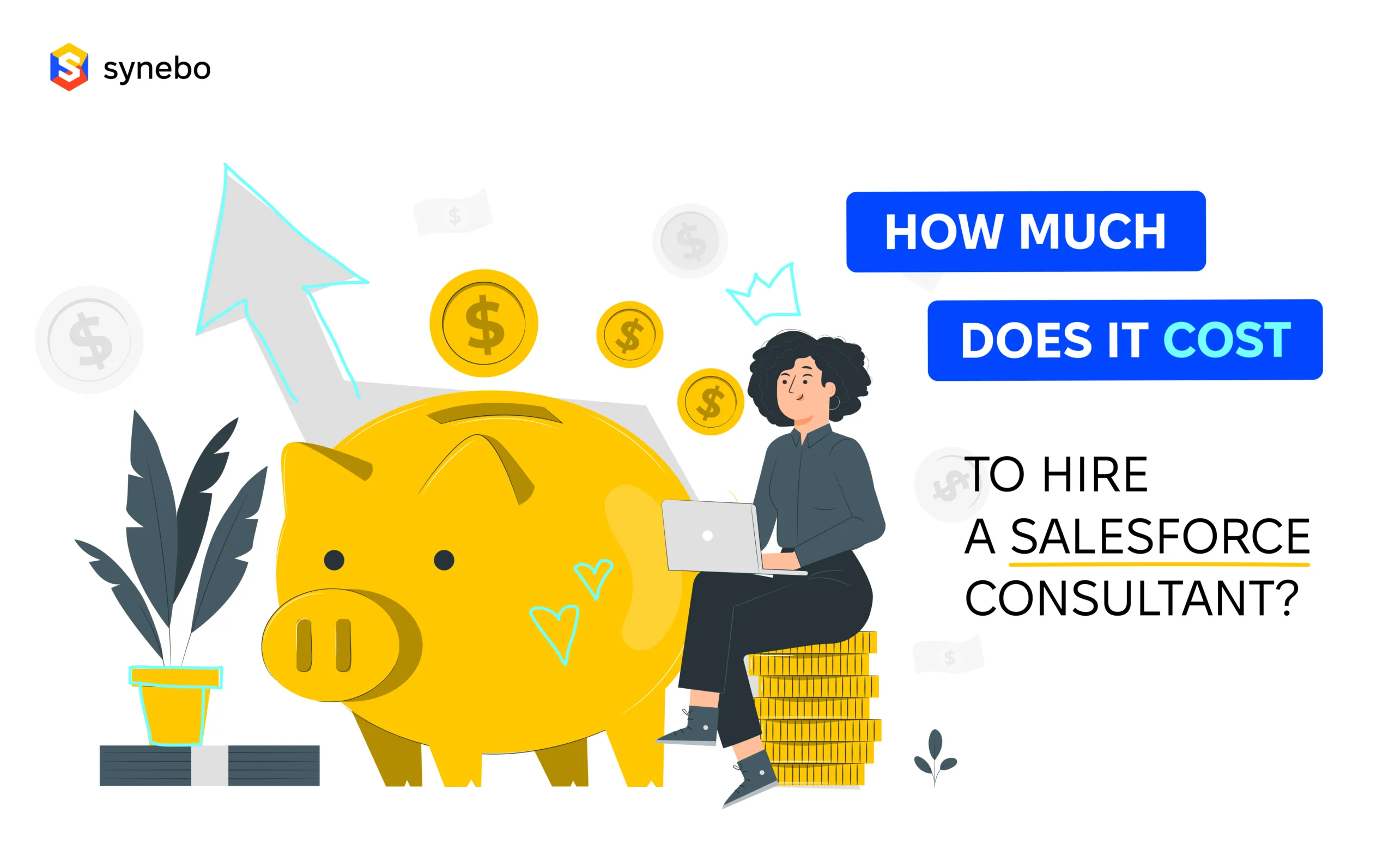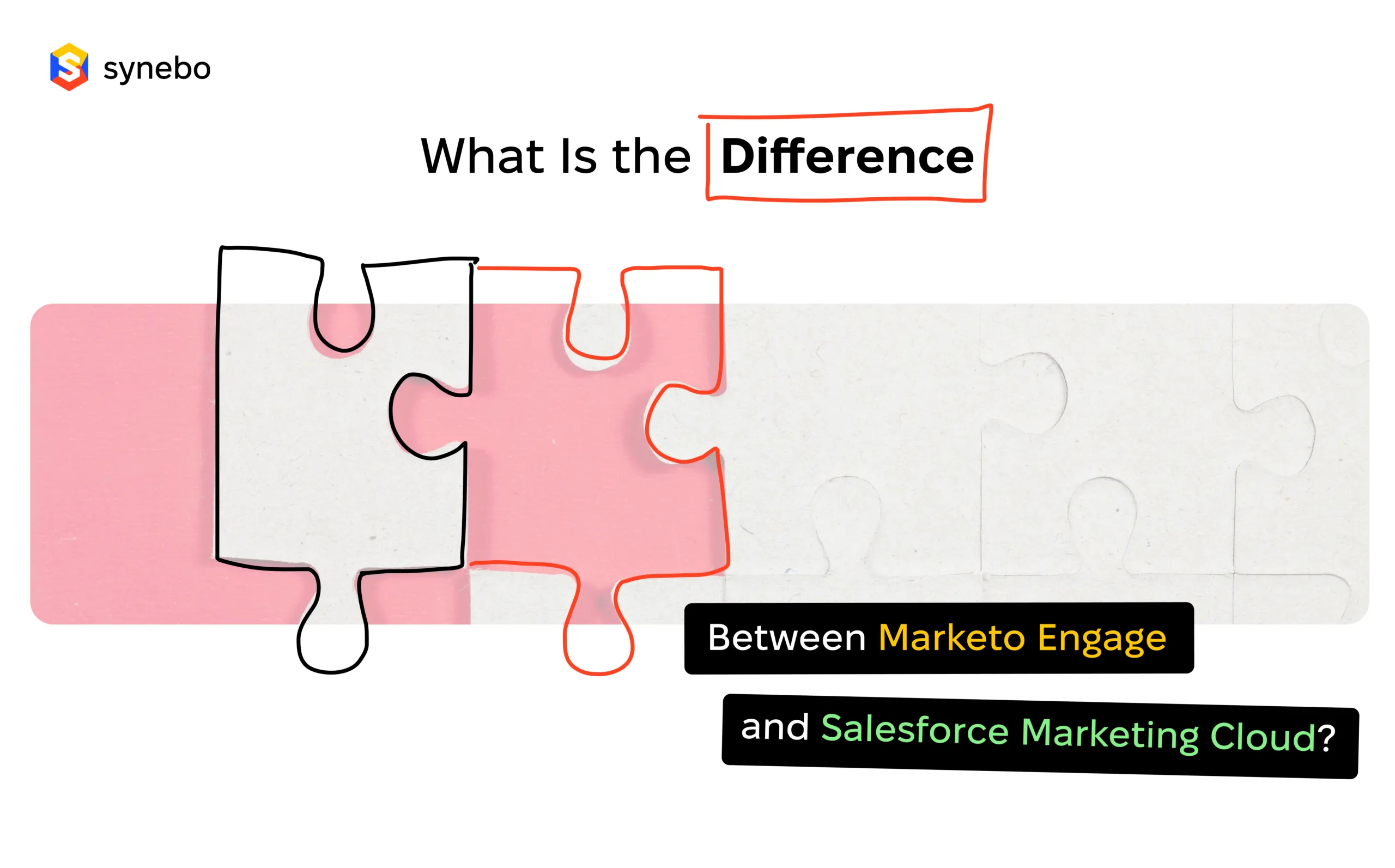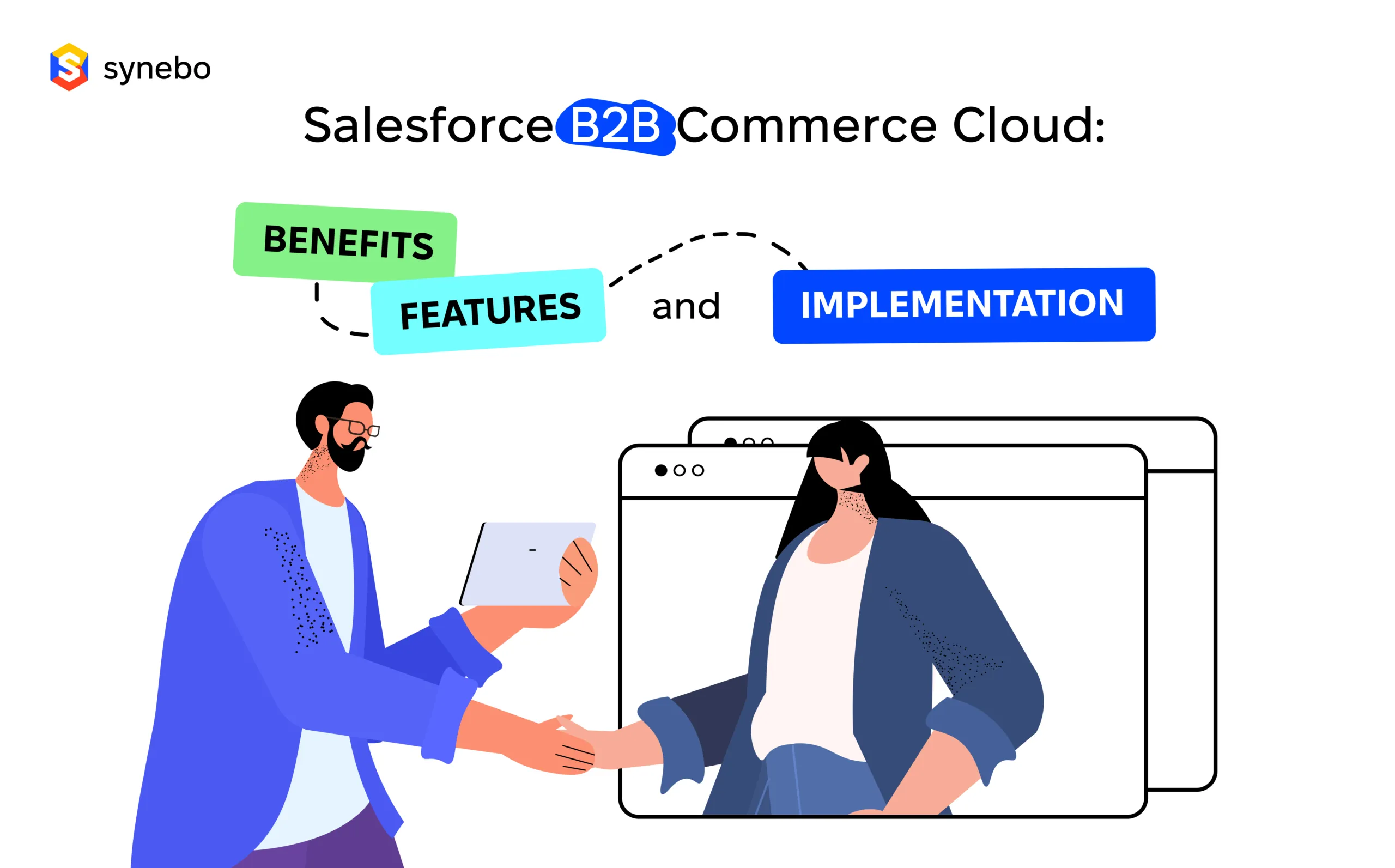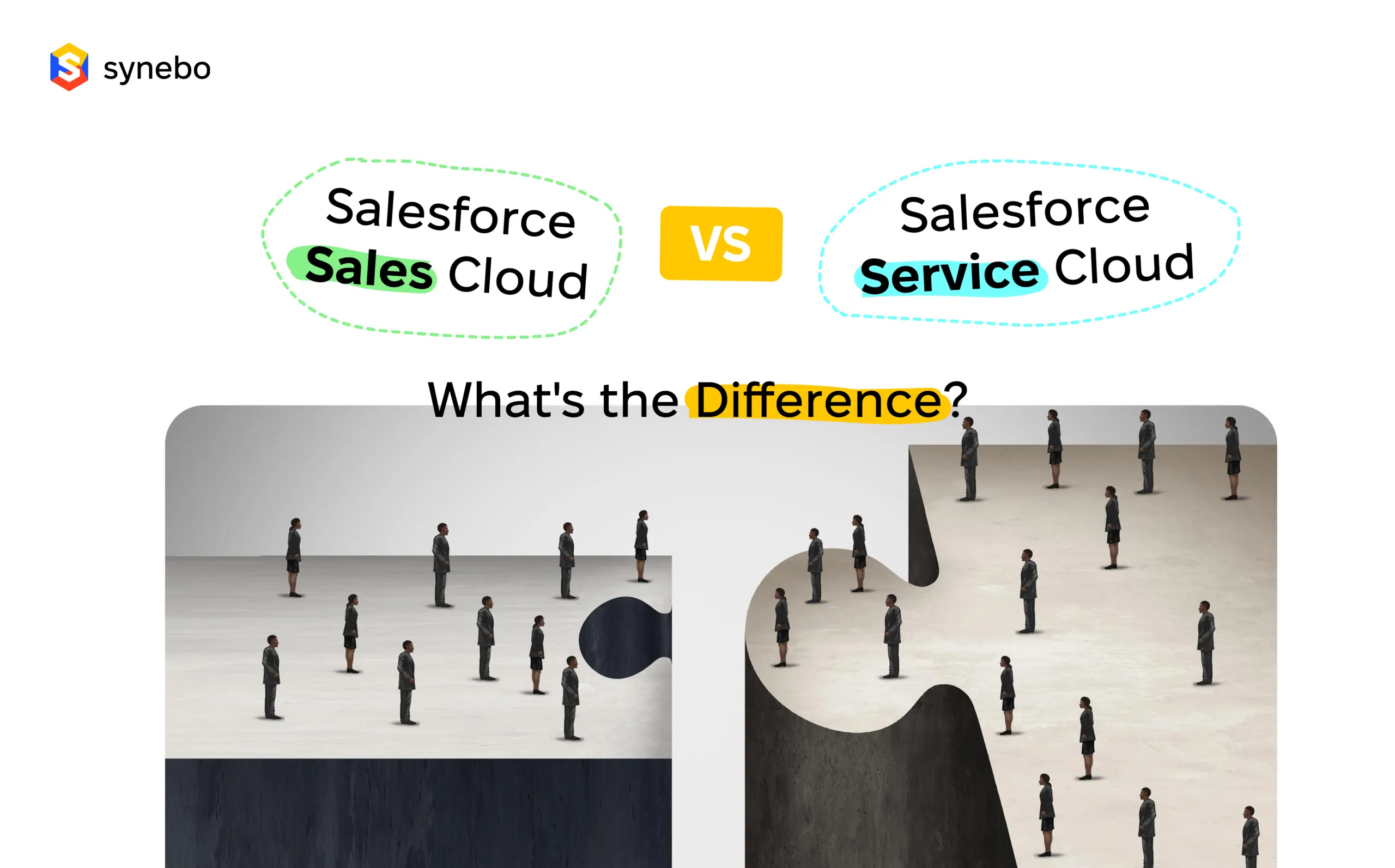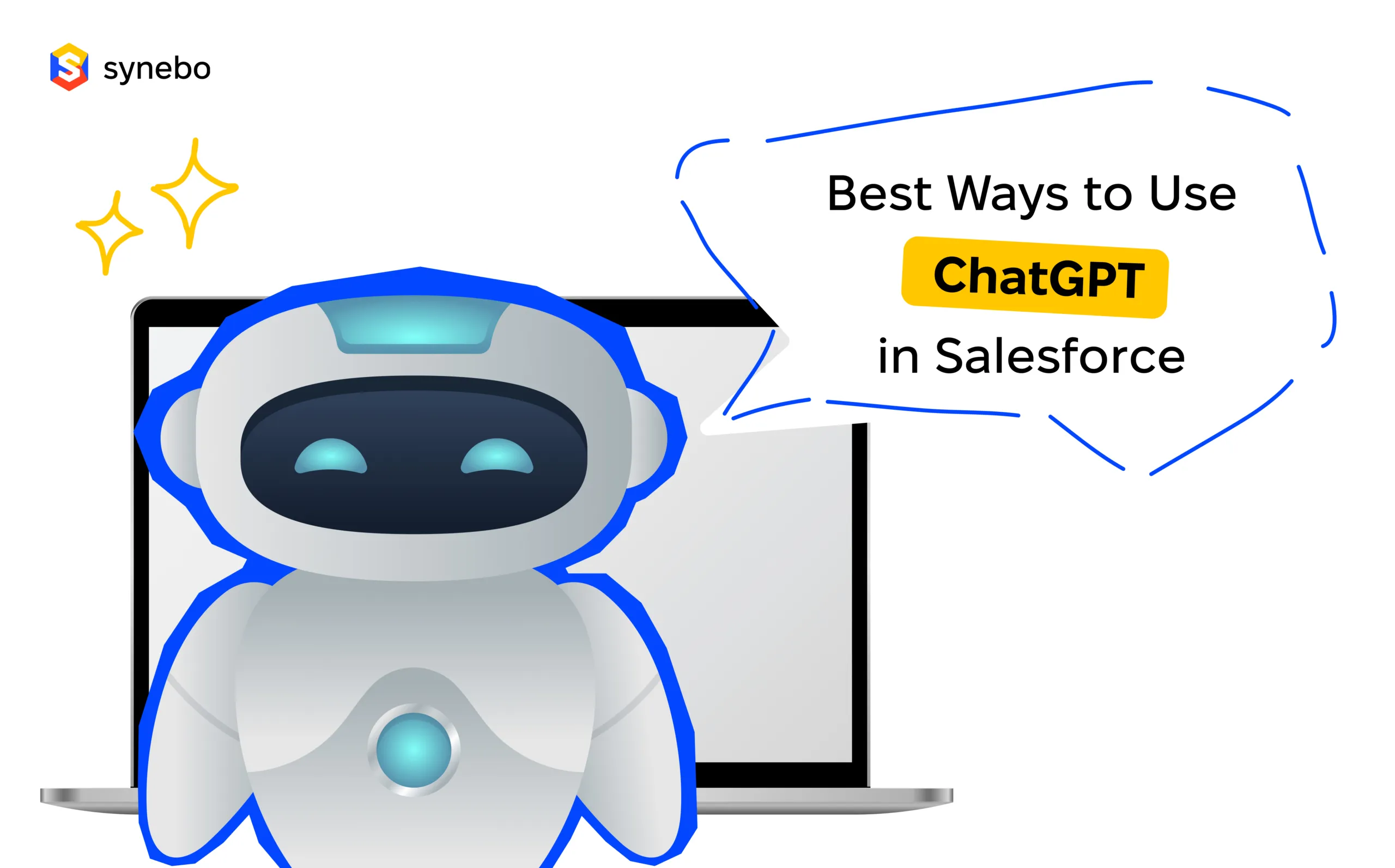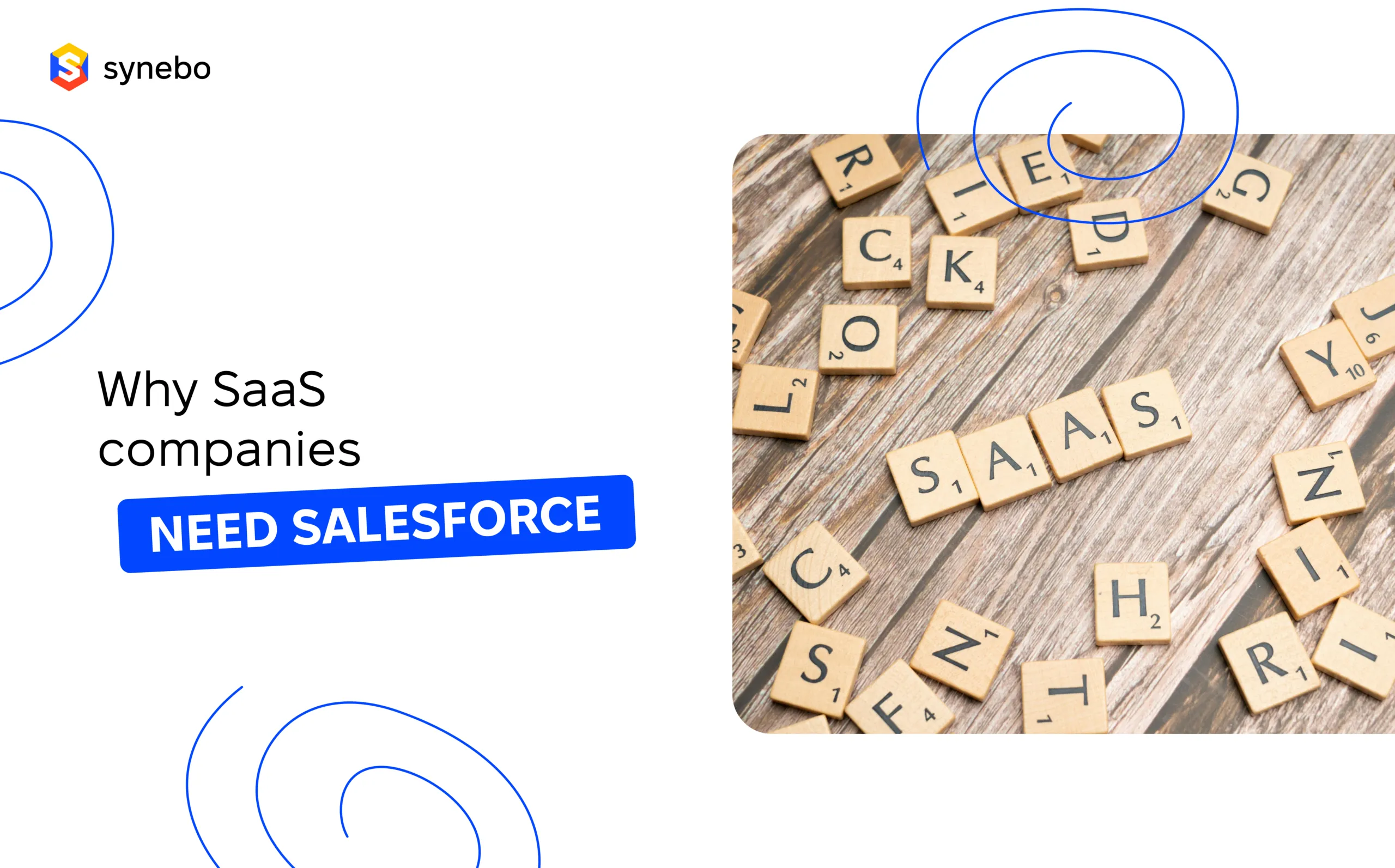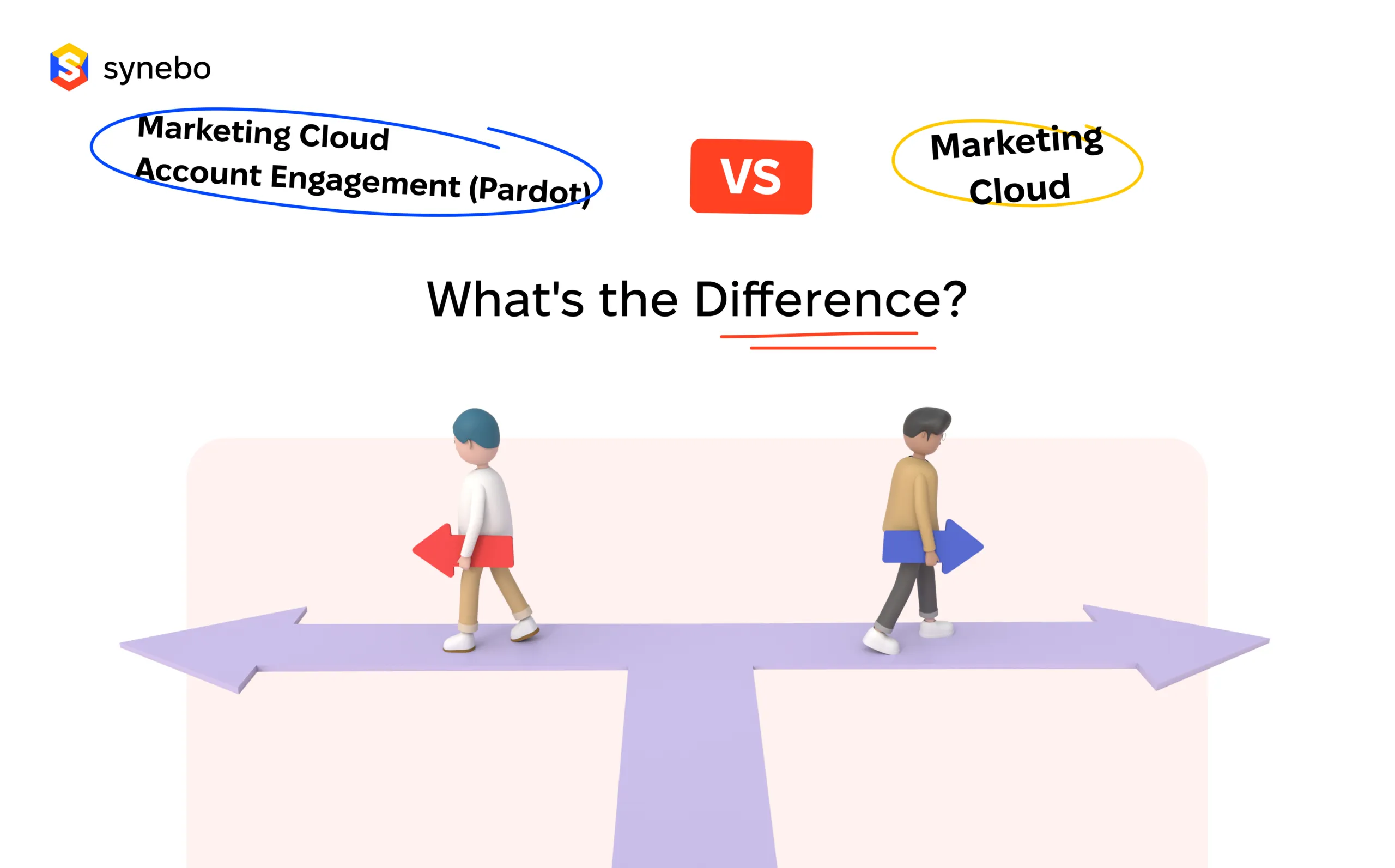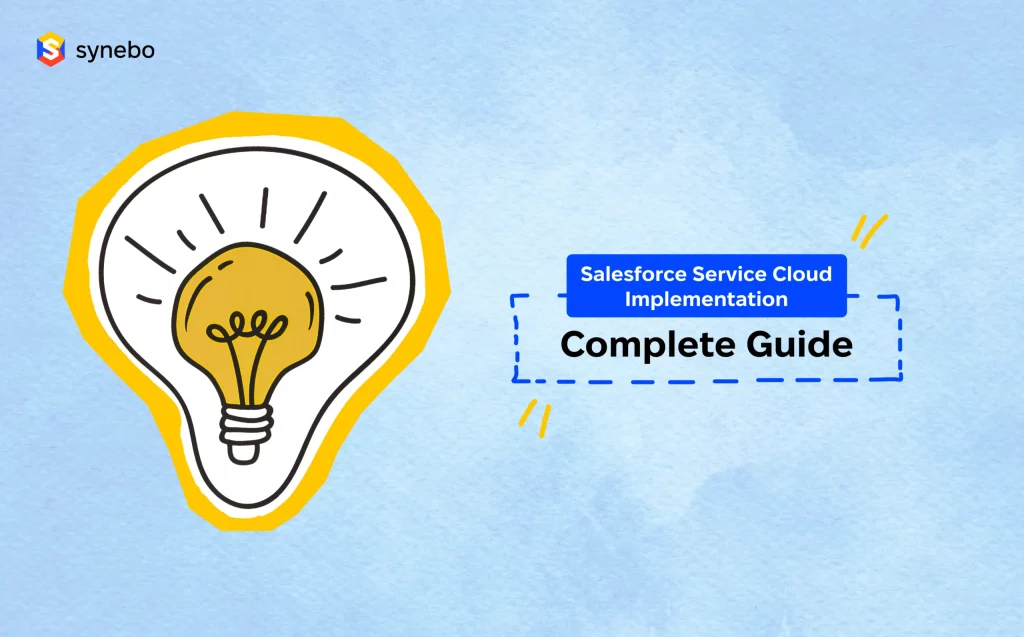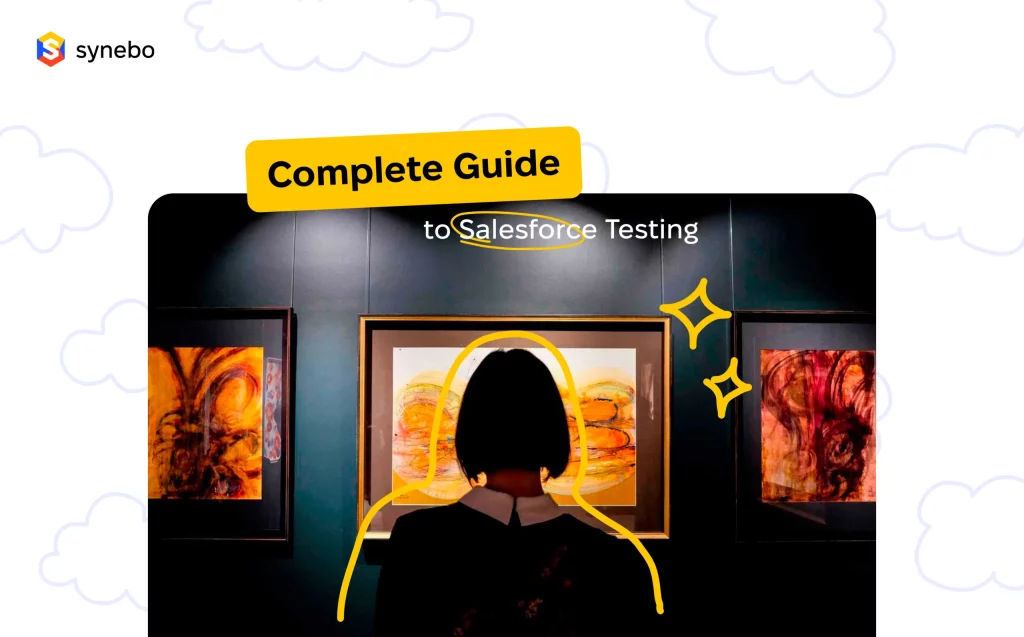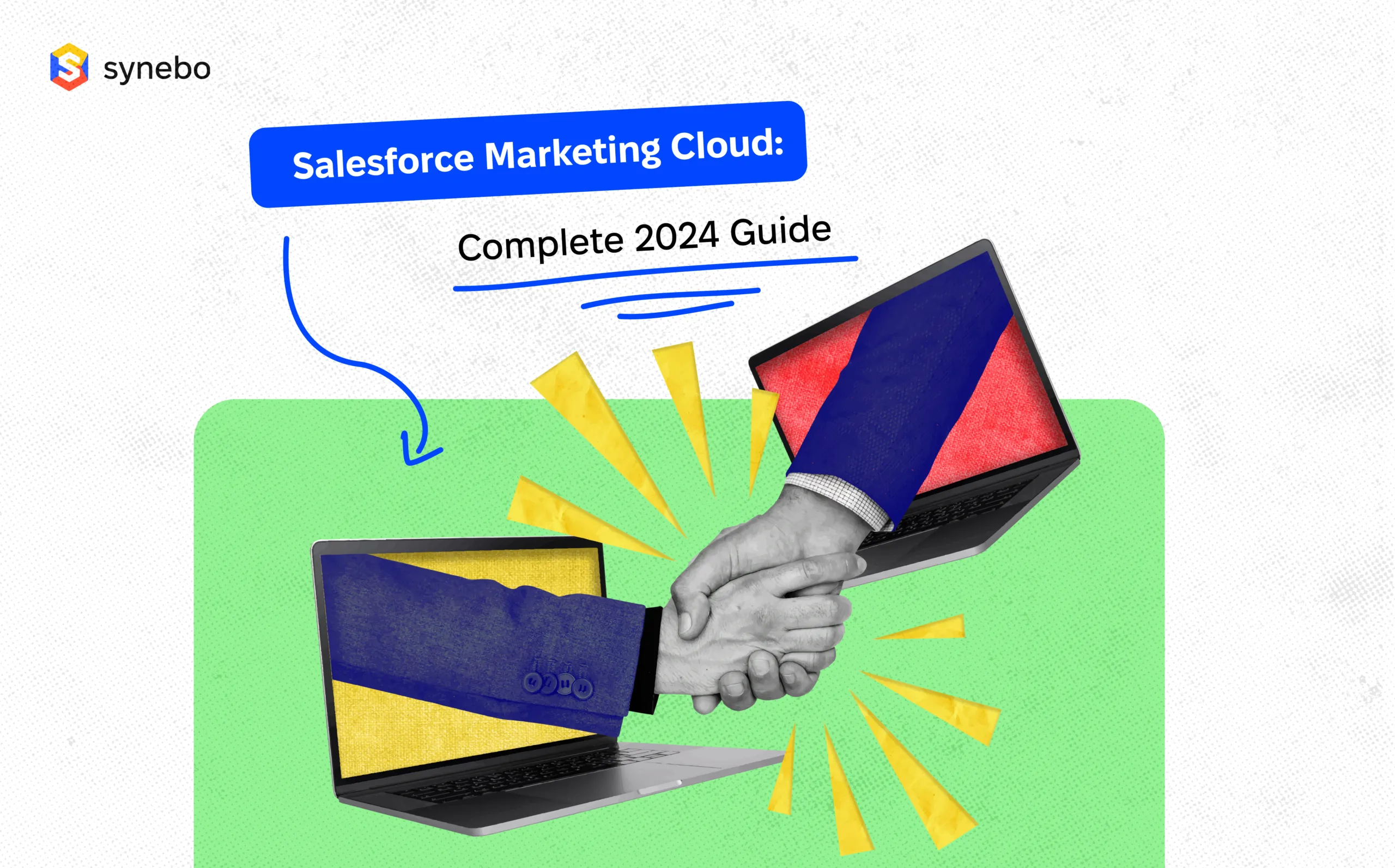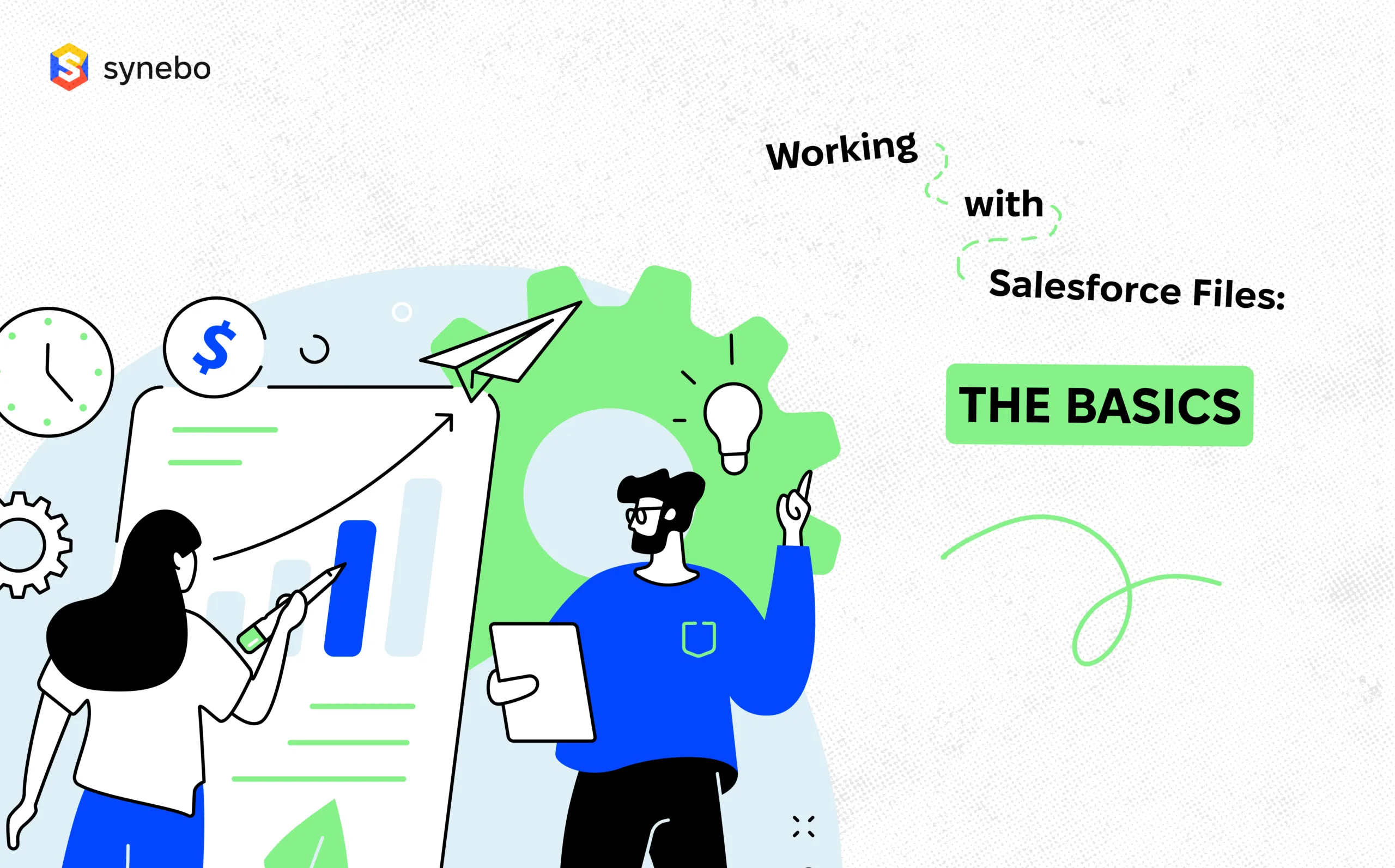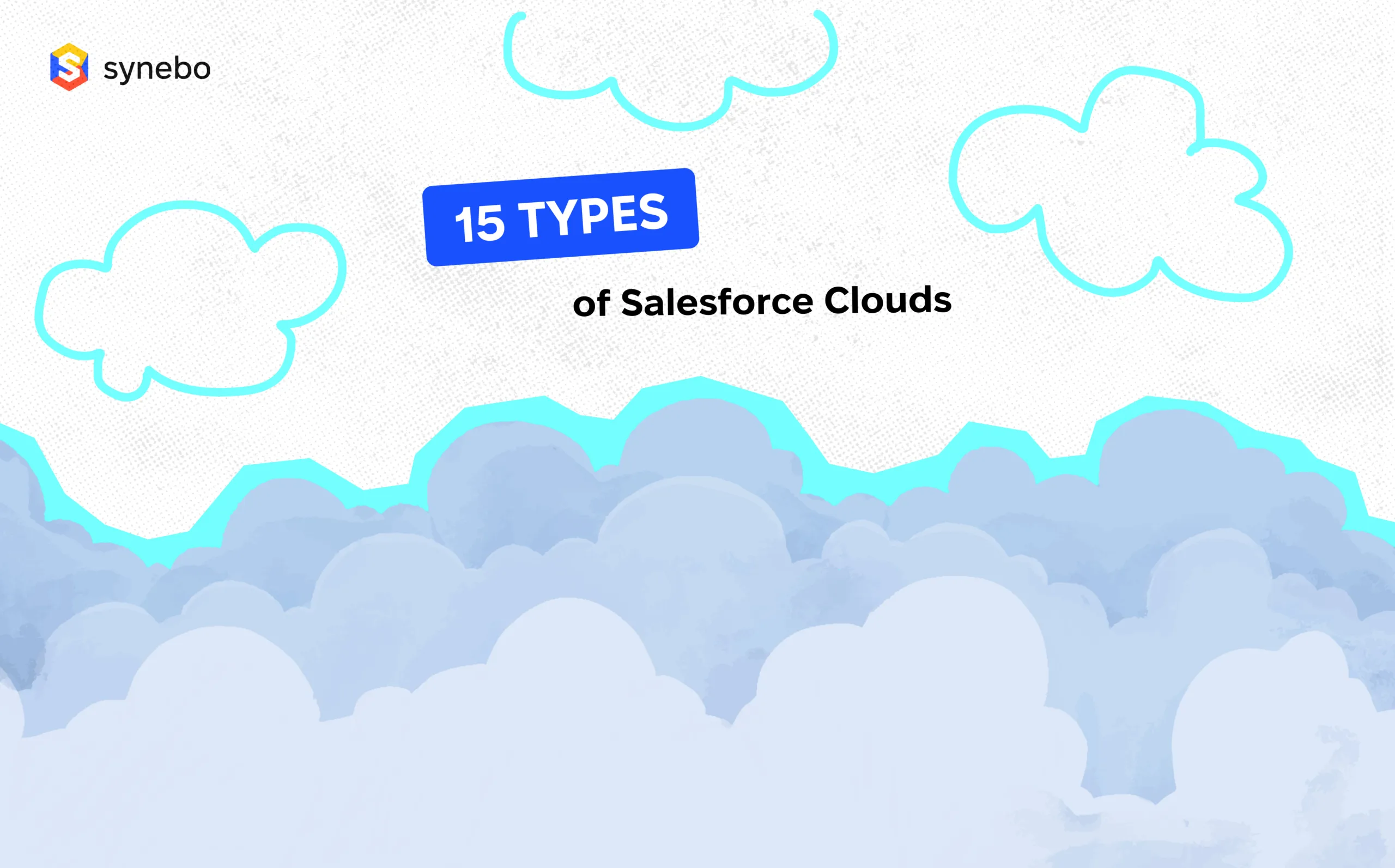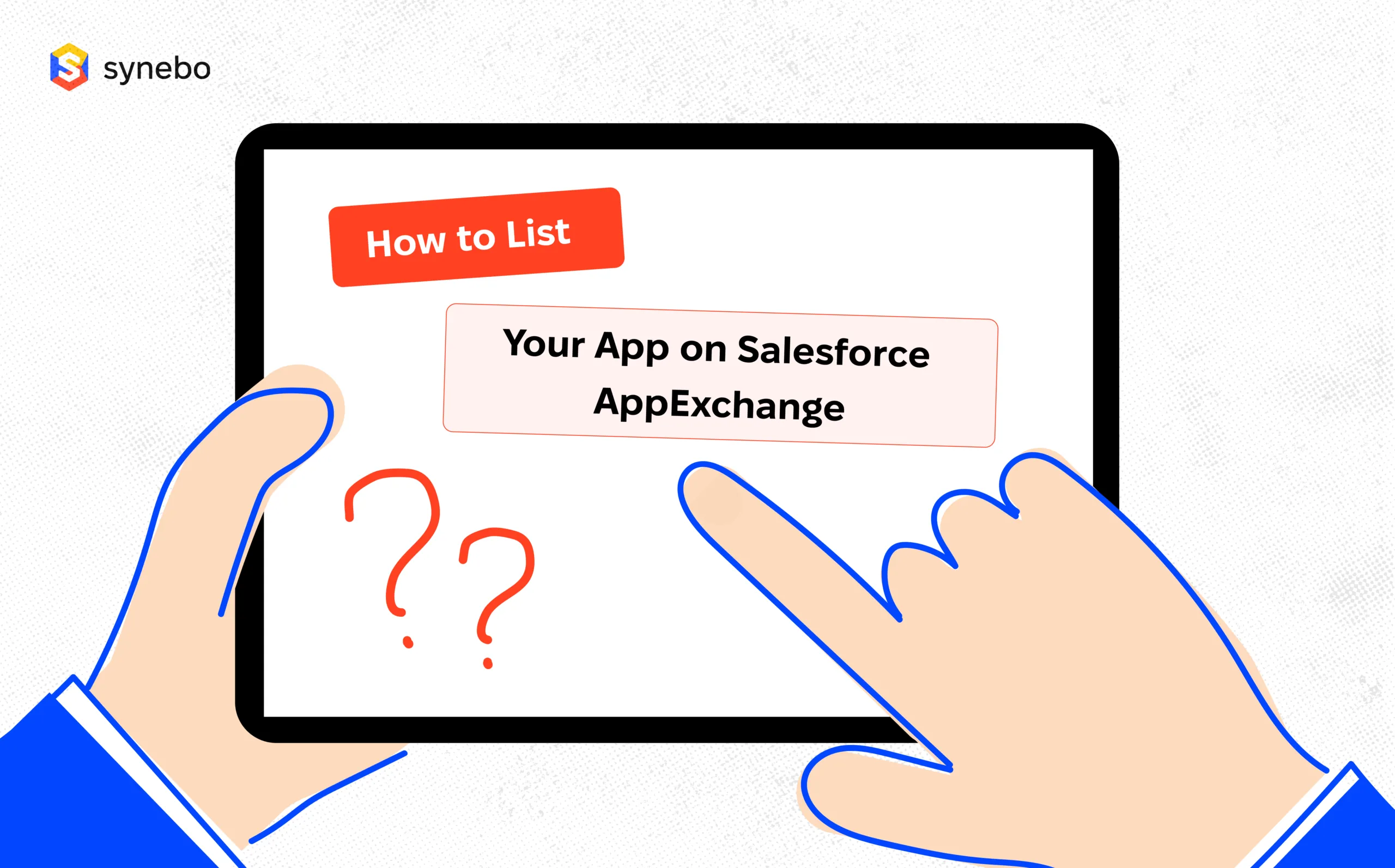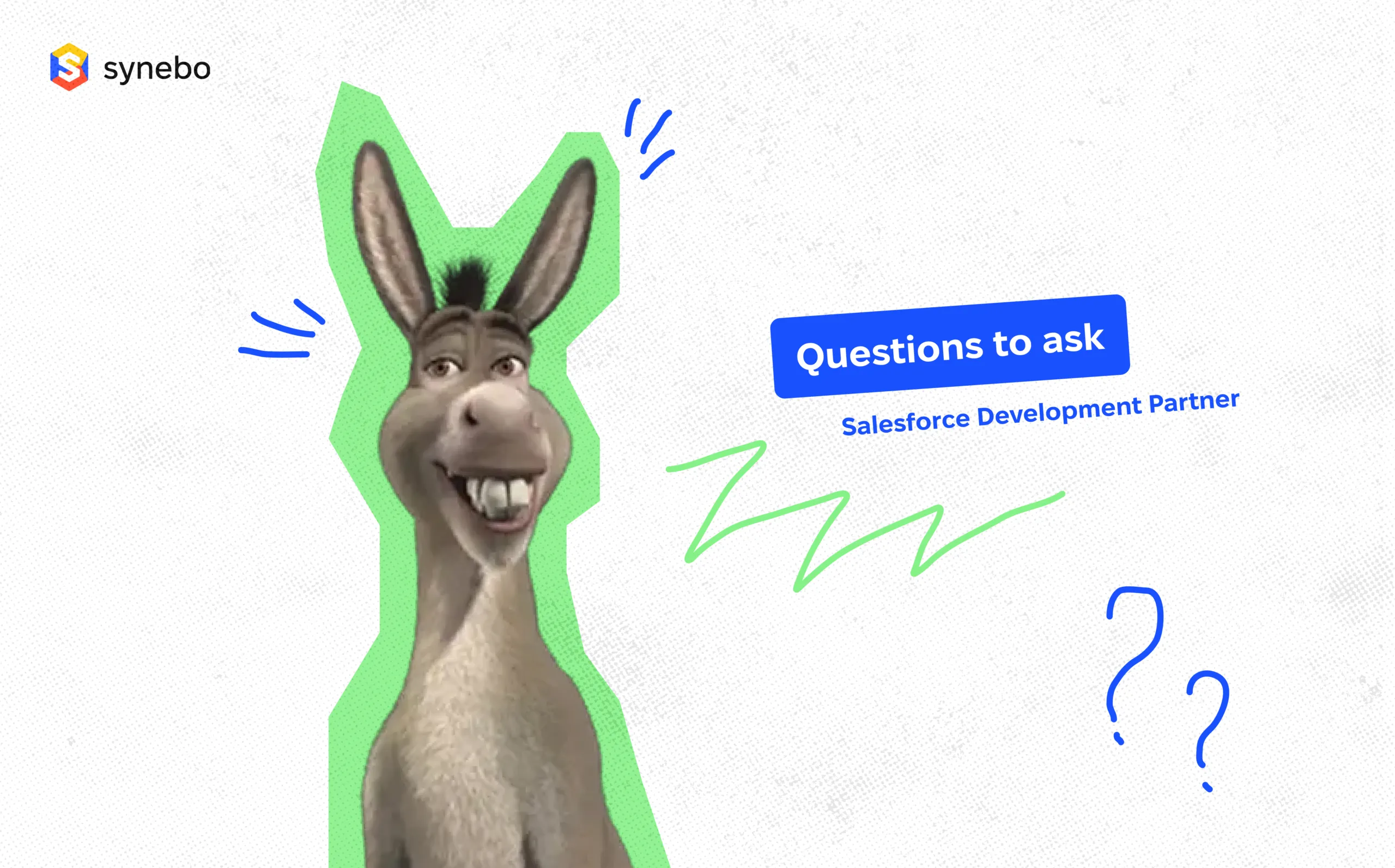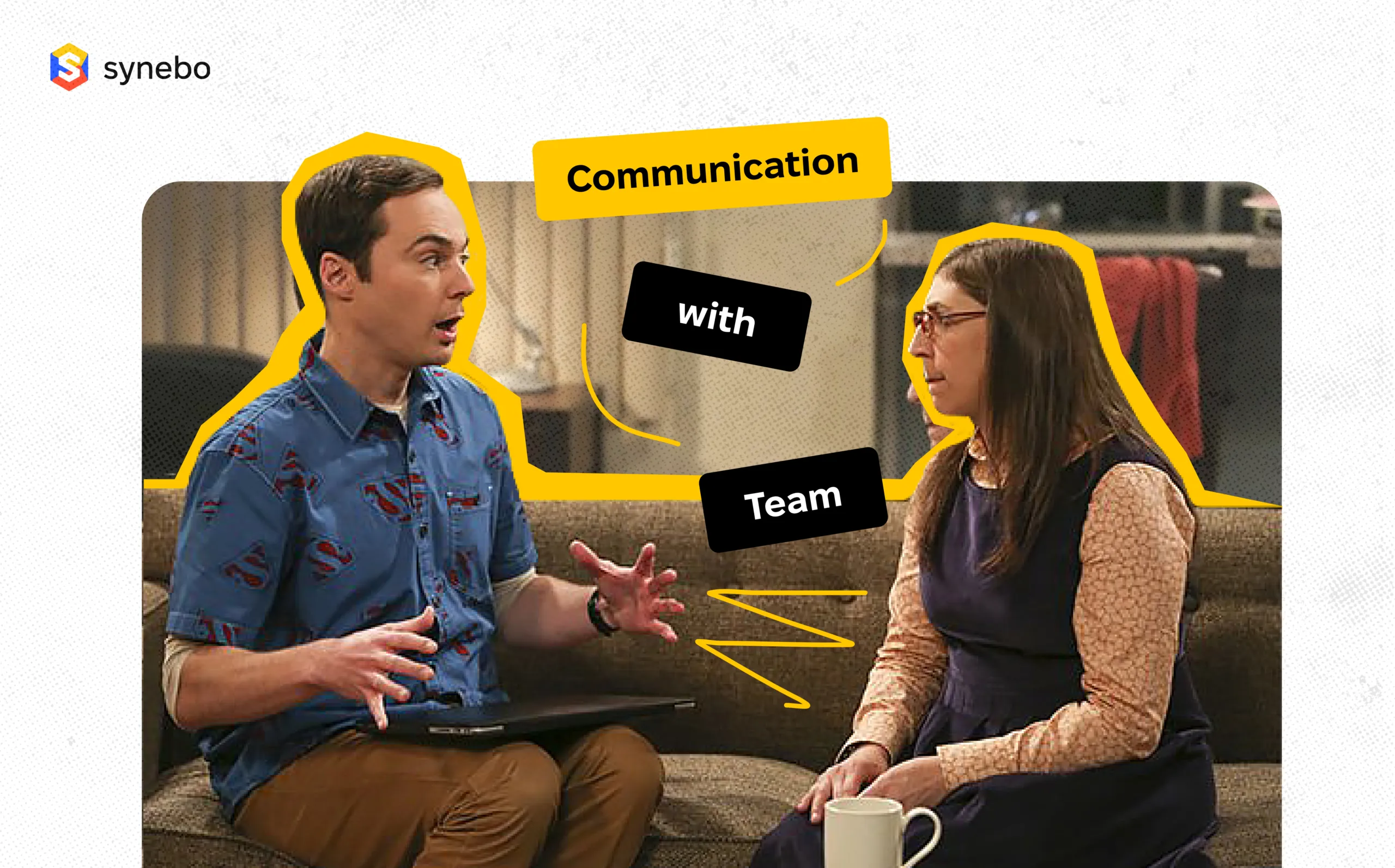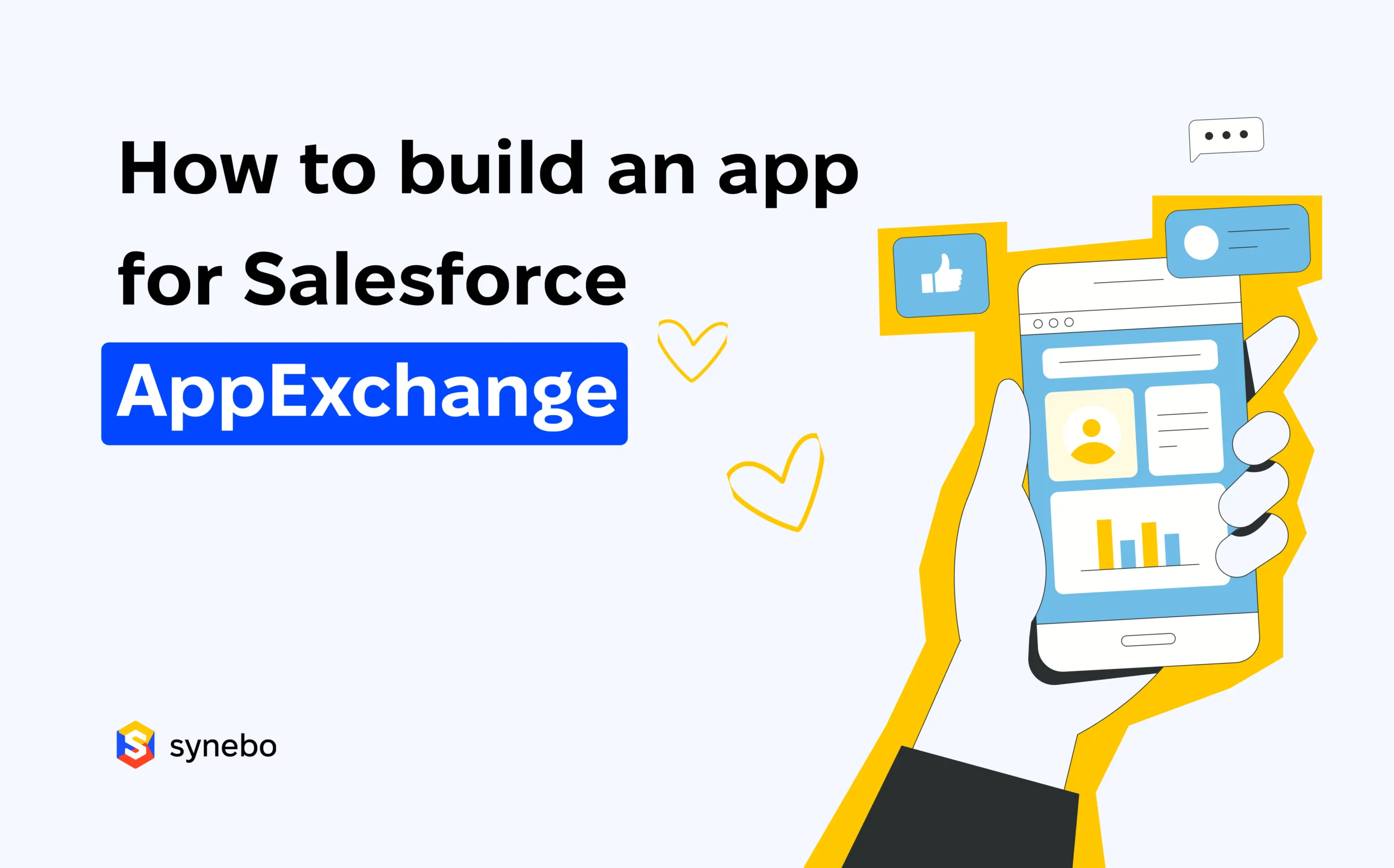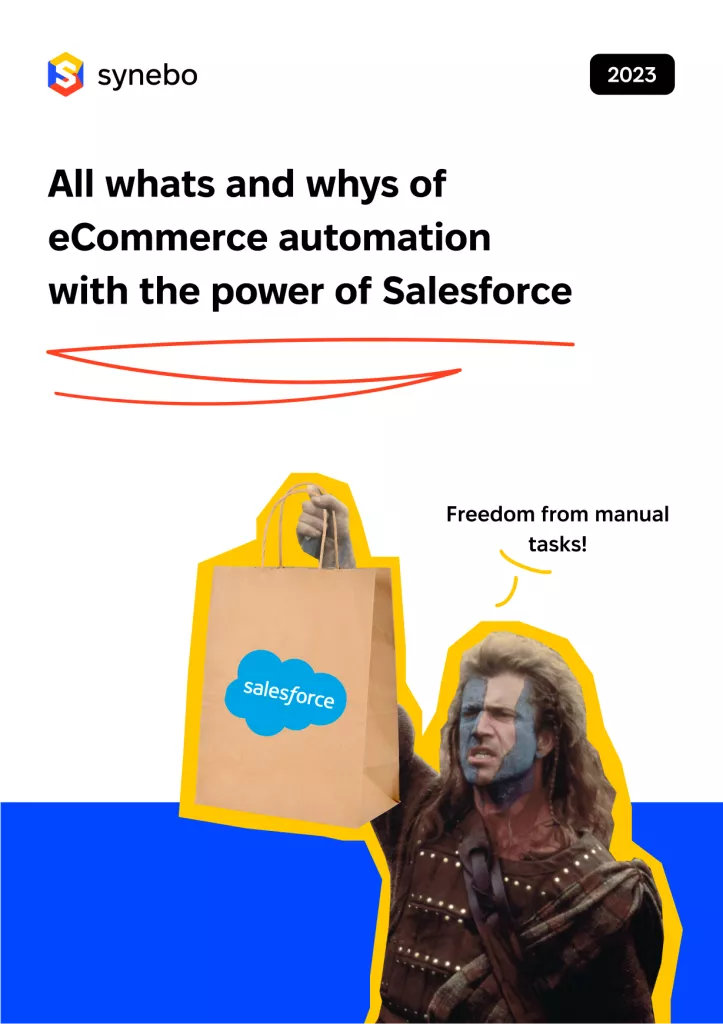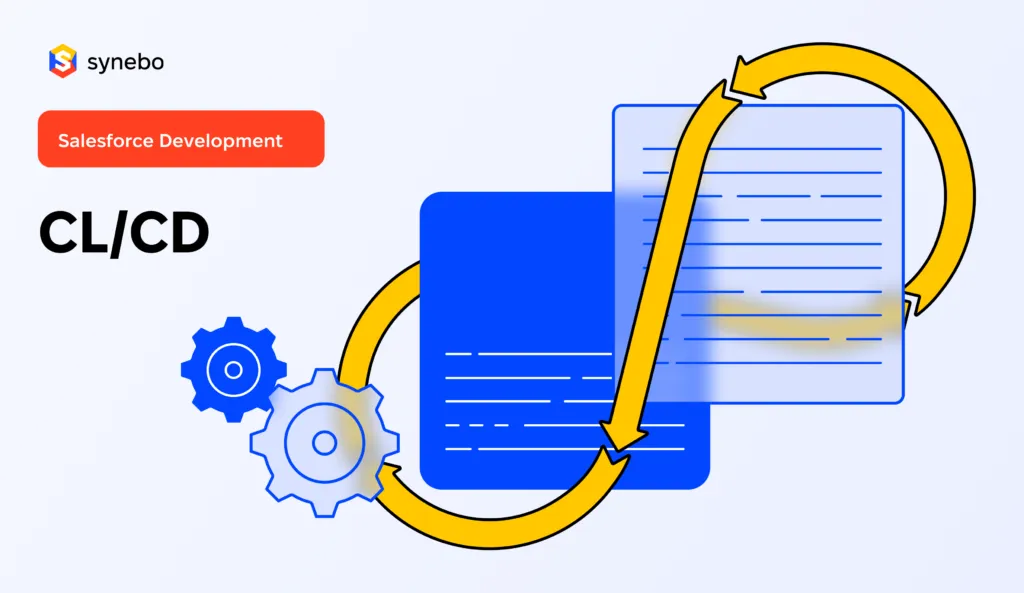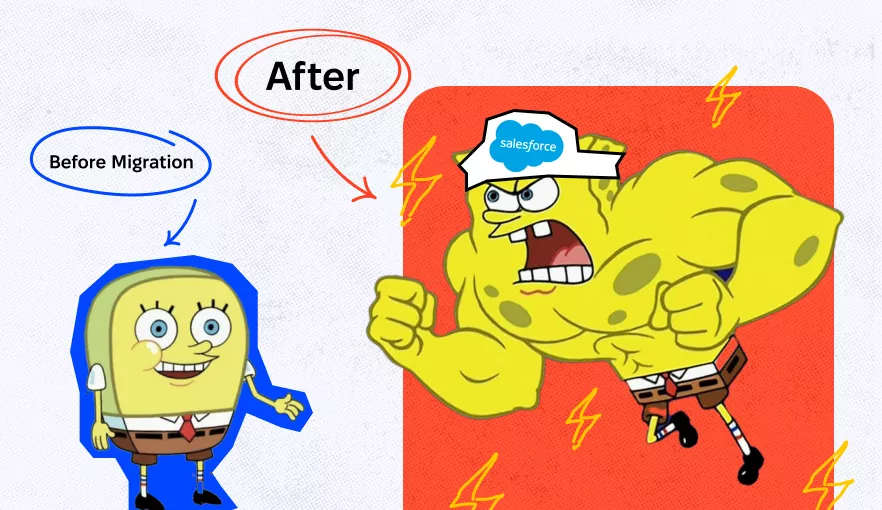What is Salesforce Experience Cloud, and What You Get From It?

Salesforce Experience Cloud, formerly known as Community Cloud, is a powerful digital experience platform developed by Salesforce. It enables organizations to create connected, personalized digital experiences for customers, partners, and employees. Think of it as a digital playground where your users can explore, connect, and engage with your organization in exciting new ways.
More than 6,900 websites are built upon Salesforce Experience Cloud, with nearly 250 of them listed in the top 10,0000 of highest-performing websites on the web. I indicate that the Salesforce Experience Cloud can truly be a perfect fit solution for particular businesses.
In this post, you’ll discover more about Salesforce Experience Cloud and the benefits it has to offer, learn its difference from its former version — Community Cloud, find out the tools and features it has, and review some real-life use cases of famous companies using Salesforce Experience Cloud.
What is Salesforce Experience Cloud?
Salesforce Experience Cloud is a digital platform for creating customized, CRM-integrated websites, portals, and mobile apps, enhancing customer, partner, and employee engagement and collaboration.
At its core, Salesforce Experience Cloud serves as a digital gateway, providing users with personalized access to the information, tools, and resources they need. It allows businesses to create captivating and intuitive experiences tailored to their unique requirements, be it for customers, partners, employees, or a combination of all.
For instance, imagine your company has multiple branches spread across different locations, and you want to create a centralized digital hub to connect employees, share information, and foster collaboration. This is where Salesforce Experience Cloud steps in to save the day.
By setting up an Experience Cloud portal, each branch can have its own dedicated space within the digital ecosystem. Employees from different locations can log in to the portal, access relevant documents, participate in discussions, and share best practices. They can connect with colleagues, collaborate on projects, and stay updated on company news and announcements. It’s like having a virtual office where everyone can come together, regardless of physical distance.
Summarizing everything, Salesforce Experience Cloud is for building:
- Personalized digital gateways
- Centralized digital hubs
- Branch-specific portals
- Virtual office environments
You can discover more about all 15 types of Salesforce Clouds from another blog post.
Salesforce Experience Cloud or Community Cloud
Salesforce Experience Cloud, previously known as Community Cloud, is the current branding for Salesforce’s platform designed to create customized digital experiences for customers, partners, and employees. The rebranding from “Community Cloud” to “Experience Cloud” reflects the platform’s expanded capabilities and focus on a wider range of digital experiences beyond just community building.
Experience Cloud encompasses a more comprehensive set of tools and features compared to Community Cloud.
Experience Cloud enables organizations to develop fully integrated, CRM-powered digital spaces for various stakeholders, promoting engagement, collaboration, and tailored interactions more diversely and dynamically than the original Community Cloud.
You can discover additional differences in Salesforce Experience Cloud features compared to Community Cloud and other changes in the table below:
| Feature | Community Cloud | Salesforce Experience Cloud |
| Focus and scope | Online communities for service and collaboration. | Diverse digital experiences including communities, portals, and apps. |
| Key components | Community builder, Chatter, knowledge base, moderation tools. | All Community Cloud features plus CMS, analytics, and personalization tools. |
| Target audience | External audiences (customers, partners). | Both internal and external audiences. |
| Customization | Limited options. | Highly customizable with code and visual tools. |
| Integration | With Salesforce data and other systems. | Tighter integration with Salesforce and broader systems. |
| Pricing | Separate license required. | Included in Experience Cloud license, with various tiers. |
Looking to hire a Salesforce Experience Cloud consultant? Drop Synebo a line, and let’s discuss!
Benefits of Salesforce Experience Cloud
Let’s explore the key advantages that Experience Cloud brings to the table, equipping you with the knowledge needed to harness its power for your business’s success.
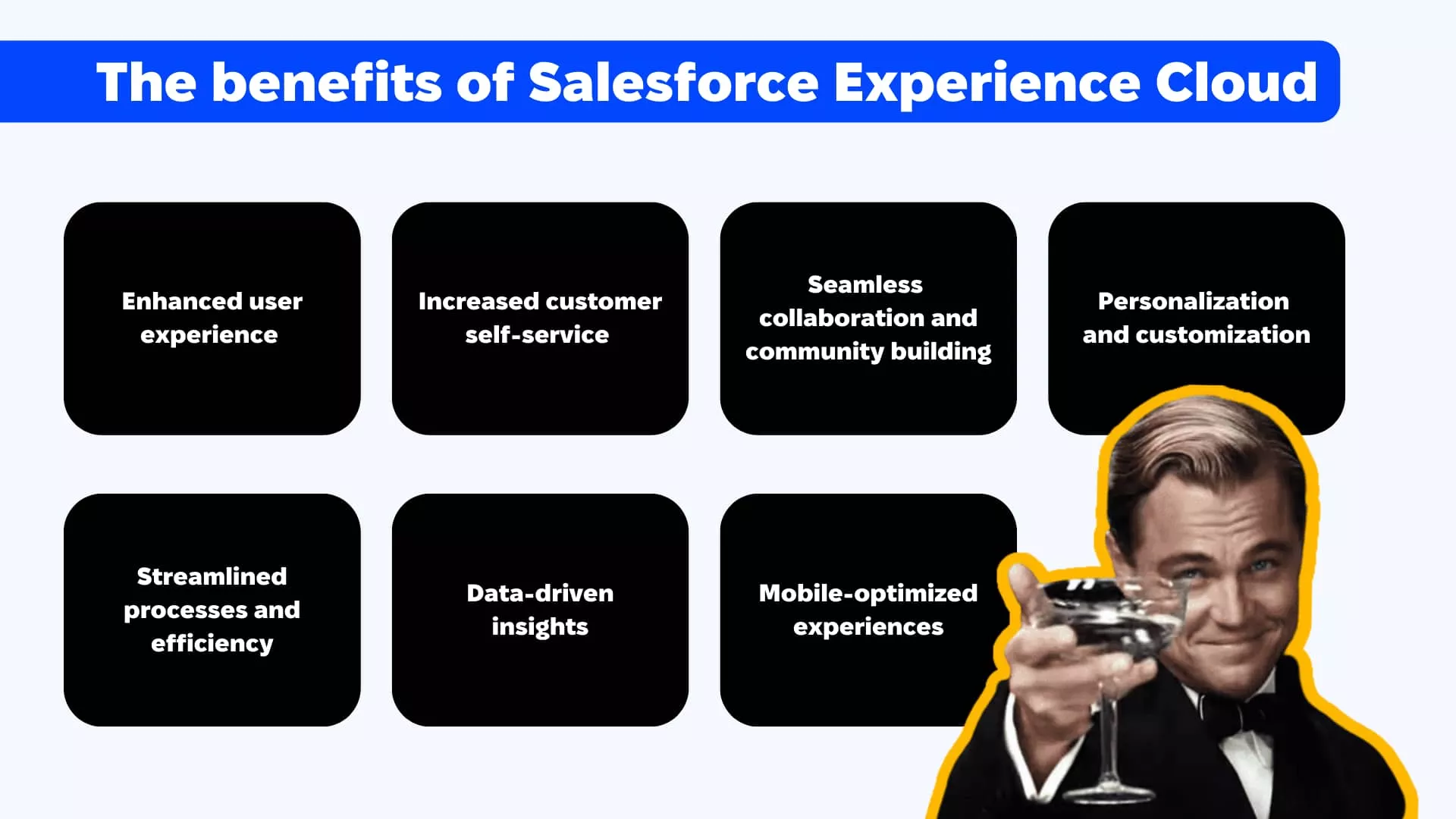
Enhanced User Experience
Experience Cloud enables businesses to deliver personalized, intuitive, and visually appealing experiences to their users. By tailoring content, navigation, and functionality, businesses can create an interface that meets the unique needs and preferences of their target audience.
This enhances user satisfaction, engagement, and loyalty.
Increased Customer Self-Service
With Experience Cloud, businesses can empower their customers to find answers to their queries independently. By providing self-service options such as knowledge bases, FAQs, and community forums, businesses can reduce the burden on support teams while enabling customers to resolve their issues quickly and efficiently.
This leads to improved customer satisfaction and reduced support costs.
Seamless Collaboration and Community Building
In the age of remote and hybrid work, providing your teams with ways to collaborate from anywhere easily is crucial. Experience Cloud facilitates collaboration and community building within and beyond the organization. Businesses can create digital spaces where employees, customers, partners, and other stakeholders can connect, share knowledge, and collaborate on projects.
This fosters a sense of community, encourages idea exchange, and drives innovation.
Personalization and Customization
One of the critical strengths of Experience Cloud is its ability to deliver personalized experiences. By leveraging user data and insights, businesses can provide tailored recommendations, content, and offers to individual users.
This level of personalization enhances user engagement, strengthens relationships, and boosts conversion rates.
Streamlined Processes and Efficiency
Experience Cloud integrates seamlessly with Salesforce’s suite of products and tools, providing businesses with a unified platform for managing customer relationships, case management, e-commerce, and more.
This integration streamlines processes, reduces manual efforts, eliminates data silos, and enhances operational efficiency.
Scalability and Flexibility
Experience Cloud is highly scalable, allowing businesses to expand and adapt as their needs evolve. Whether it’s adding new users, incorporating additional features, or accommodating growing user demands, Experience Cloud provides the flexibility to scale and customize the platform accordingly.
Data-Driven Insights
Experience Cloud is equipped with robust analytics and reporting capabilities, providing businesses with valuable insights into user behavior, engagement levels, and content performance.
These data-driven insights enable businesses to make informed decisions, optimize experiences, and continuously improve user satisfaction.
Mobile-Optimized Experiences
With Experience Cloud, businesses can deliver seamless experiences across multiple devices and platforms. The responsive design and mobile optimization ensure that users can access and engage with the platform anytime, anywhere, from their preferred devices.
This enhances convenience and accessibility.
You can discover more about all what you can get from Salesforce Experience Cloud from another blog post.
The main tools and features of Salesforce Experience Cloud
Now that we know what Experience Cloud brings to the table in terms of business improvement, we can take a closer look at the tools and features that companies get adopting this Cloud.
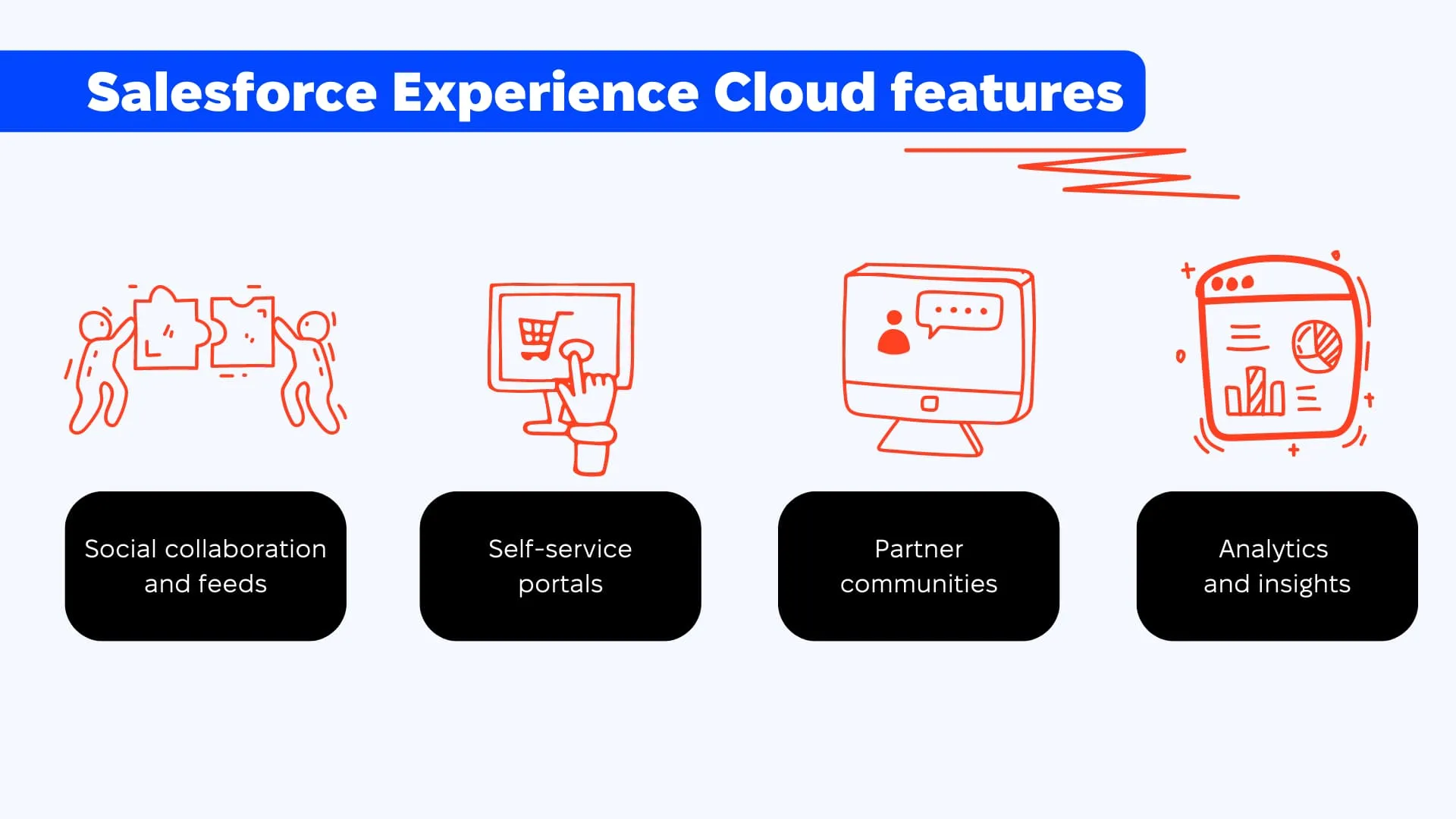
Self-Service Portals
Salesforce Experience Cloud features enable businesses to create self-service portals where customers can find answers to their questions, access support resources, and troubleshoot common issues independently. These portals reduce the load on customer support teams and empower customers to find solutions quickly and efficiently.
For instance, a telecommunications company can build a self-service portal using Experience Cloud and allow customers to manage their accounts, pay bills, and troubleshoot common service issues.
You may additionally be interested in learning more about Salesforce Sales cloud: from A to Z.
Partner Communities
Experience Cloud’s partner community functionality facilitates collaboration and engagement with external partners such as distributors, resellers, or suppliers. It enables secure access to shared resources, joint deal management, and seamless communication, streamlining business processes and strengthening partner relationships.
This feature can be useful, for example, for manufacturing companies that want to provide real-time updates on product availability, share marketing collateral, and facilitate deal registration with their distributors.
Need Salesforce development or integration services? Don’t hesitate to reach out to Synebo.
Gamification and Rewards
Experience Cloud offers gamification features that businesses can utilize to drive engagement and motivate users within their digital communities. Companies can encourage active participation, knowledge sharing, and healthy competition among community members by incorporating game-like elements, badges, leaderboards, and rewards.
Thus, a software company, for instance, can implement gamification in their user community powered by Experience Cloud. Users earn points and badges by contributing valuable insights, helping others, or completing certain activities. This fosters a sense of achievement, encourages community engagement, and boosts user retention.
Social Collaboration and Feeds
Salesforce Experience Cloud includes social collaboration tools that allow community members to interact, share ideas, and collaborate in real-time. Feeds, similar to social media platforms, provide a space for discussions, comments, and content sharing, fostering a sense of community and enabling knowledge exchange.
An educational institution, for example, can leverage Experience Cloud’s social collaboration features to create a student community. Students can share study resources, discuss coursework, and collaborate on group projects through feeds and real-time messaging. This promotes student engagement, facilitates peer learning, and creates a supportive learning environment.
Analytics and Insights
Experience Cloud incorporates robust analytics capabilities, providing businesses with actionable insights into community engagement, user behavior, and content performance. These analytics help businesses identify trends, measure the effectiveness of community initiatives, and optimize their strategies for better outcomes.
As an example, healthcare organizations can use Experience Cloud’s analytics to monitor user engagement within their patient community. They can analyze metrics such as active users, popular discussion topics, and content consumption patterns to identify areas of improvement and tailor their community content and resources accordingly.
Now, let’s summarise everything that you can expect from every Salesforce Experience Cloud. The table with a detailed overview is provided below:
| Category | Key Features |
| Customer-Centric Experiences |
– Personalized portals- FAQs – Help centers – Brand communities – Loyalty programs – Leveraging CRM data for tailored customer experiences. |
| Enhanced Partner Collaboration |
– Partner portals and communities- Tools for co-selling, – Joint marketing campaigns – Streamlined partnership management and collaboration |
| Internal Communication & Productivity |
– Employee communities- Knowledge bases – Onboarding – Training portals – Sales enablement – Fostering internal communication and productivity |
| Engaging Digital Content & Experiences |
– Microsites- Landing pages – Branded websites – Content management and personalization – Event management and registration – Engaging user content |
| Integration & Customization |
– Seamless Salesforce CRM integration- AppExchange – Custom components – Drag-and-drop builder – Mobile-first design – Extensive customization options |
Looking for a Salesforce partner to help you make use of Salesforce Experience Cloud capabilities? Drop Synebo a line.
Companies Using Salesforce Experience Cloud
Salesforce Experience Cloud has garnered significant adoption across industries, enabling brands to deliver exceptional digital experiences to their customers. Let’s explore how some renowned brands opted to hire a Salesforce Experience Cloud implementation consultant and utilize Experience Cloud to enhance their customer engagement and achieve remarkable results.
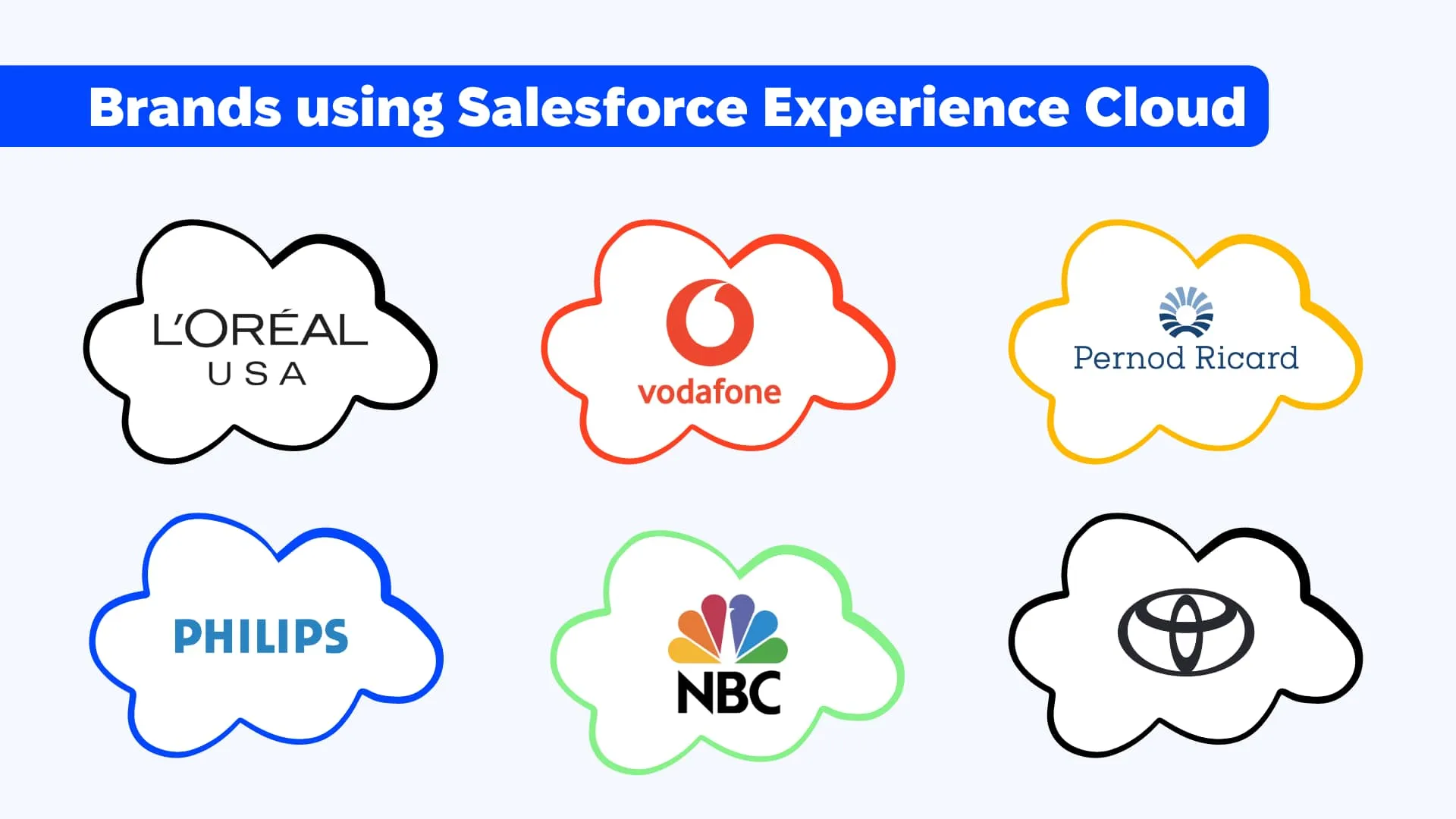
Pernod Ricard
Pernod Ricard, a global leader in wines and spirits, recognized the need to provide an immersive and personalized digital experience to its customers. By leveraging Salesforce Experience Cloud, Pernod Ricard revolutionized the way consumers interacted with their brands, such as Absolut Vodka, Jameson Irish Whiskey, and Martell Cognac.
Through Experience Cloud, Pernod Ricard crafted engaging brand portals that showcased their extensive product portfolio, curated cocktail recipes, and educational content. Customers gained access to exclusive events, tastings, and personalized recommendations based on their preferences. By leveraging Experience Cloud’s robust capabilities, Pernod Ricard strengthened brand loyalty, amplified customer advocacy, and ultimately boosted sales.
Toyota
Toyota, a renowned automotive manufacturer, embraced Salesforce Experience Cloud to enhance its digital customer experiences across multiple touchpoints. With Experience Cloud, Toyota streamlined its customer journey, seamlessly integrating online and offline interactions.
Through personalized portals, Toyota offered customers a unified platform to explore vehicle options, schedule test drives, and access post-purchase services. Experience Cloud allowed Toyota to deliver tailored content, including relevant promotions, maintenance tips, and personalized offers, creating a cohesive and personalized customer experience. As a result, Toyota witnessed increased customer satisfaction, higher lead conversion rates, and improved brand loyalty.
NBC
NBC, a prominent media and entertainment company, leveraged Salesforce Experience Cloud to deliver captivating digital experiences to its vast audience base. With Experience Cloud’s omnichannel capabilities, NBC unified its content distribution across web, mobile, and social channels.
By leveraging Experience Cloud, NBC created personalized portals where viewers could access their favorite shows, catch up on missed episodes, and explore exclusive content. The interactive and immersive experience enhanced viewer engagement, leading to increased viewership, extended session durations, and enhanced monetization opportunities.
Vodafone
Vodafone, a leading telecommunications company, implemented Salesforce Experience Cloud to empower its customers with self-service capabilities. By providing a seamless and intuitive digital experience, Vodafone aimed to reduce customer support inquiries and enhance customer satisfaction.
With Experience Cloud, Vodafone created robust customer portals that allowed subscribers to manage their accounts, view usage details, pay bills, and access support resources. The self-service capabilities enabled customers to resolve issues independently, resulting in reduced call volumes and improved customer service efficiency.
L’Oréal USA
L’Oréal USA, a renowned beauty and cosmetics company, embraced Salesforce Experience Cloud to deliver personalized experiences to its diverse customer base. By leveraging Experience Cloud’s personalization capabilities, L’Oréal USA created tailored portals that offered beauty tips, product recommendations, and exclusive offers.
Customers could engage with interactive content, virtual beauty consultations, and access educational resources to enhance their beauty journey. Through Experience Cloud, L’Oréal USA strengthened customer relationships, increased brand advocacy, and achieved higher conversion rates.
Philips
Philips, a globally renowned company known for its innovations in healthcare technology, as well as a wide range of consumer products, has leveraged Salesforce Experience Cloud to revolutionize how patients, customers, and individuals engage with their offerings. With Experience Cloud, Philips has created seamless digital experiences that empower individuals to take control of their health, as well as enhance their daily lives with smart solutions.
Recognizing the importance of personalized healthcare experiences, Philips implemented Experience Cloud to develop patient portals that enable users to access their personal health records, schedule appointments, and communicate with healthcare professionals. By providing a user-friendly and secure digital platform, Philips enhances the patient experience and fosters a proactive approach to health management.
Final Take
As you embark on your own journey with Salesforce Experience Cloud, we encourage you to embrace the endless possibilities it offers. Tailor experiences, foster collaboration, and unleash the full potential of this platform to create meaningful connections with your audience. Remember, every touchpoint is an opportunity to leave a lasting impression.
And If you find yourself seeking guidance or have questions along the way, know that help is readily available. Whether it’s through Salesforce’s robust support system or partnering with experienced consultants like the Synebo team, you can navigate the intricacies of Experience Cloud with confidence. So, don’t hesitate to reach out to us and get help with your Salesforce journey.









